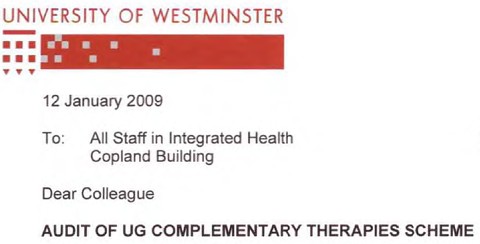David Colquhoun
This letter appeared in the Times on Friday 30 January, 2009. It was prompted by the news from the University of Salford, but its main purpose was to try to point out to the Department of Health that you can’t hope to regulate alternative treatments in any sensible way while continuing to push under the carpet the crucial question of which ones work and which don’t.
| Sir
We would like to congratulate the vice-chancellor of the University of Salford, Professor Michael Harloe for his principled decision to drop “all the University’s programmes associated with complementary medicine within the School of Community, Health Sciences & Social Care”. This includes their “Homeopathy in Practice” degree. It is also encouraging that the University of Central Lancashire recently closed its BSc in Homeopathy to new students, and announced a review of all its activities in alternative medicine. Although universities are now taking sensible actions, government policy in the area of regulation of alternative medicine is in urgent need of revision. In May 2008 the Steering Group chaired by Professor Pittilo recommended to the Department of Health that entry into acupuncture, herbal medicine and traditional Chinese medicine should “normally be through a bachelor degree with honours”. But, in the same month, new regulations on Unfair Trading came into effect. One of the 31 commercial practices which are in all circumstances considered unfair is “falsely claiming that a product is able to cure illnesses, dysfunction or malformations”. One part of government seeks to endorse unproven and disproved treatments, at the same time as another part makes them illegal. The reason for this chaotic situation is simple. The Department of Health, and the Medicines and Healthcare products Regulatory Agency (MHRA), have consistently failed to grasp the nettle of deciding which treatments work and which don’t. That is the first thing you want to know about any treatment. Vice-chancellors seem now to be asking the question, and the government should do so too. The ideal mechanism already exists. The question should be referred to the National Institute for Health and Clinical Excellence (NICE). That was recommended by a House of Lords report in 2000, and it was recommended again by the Smallwood report (commissioned by the Prince of Wales) in 2005. Now it should be done. Sir Walter Bodmer FRCPath, FRS, FMedSci, FRCP (hon) FRCS(hon) Professor David Colquhoun, FRS Dame Bridget Ogilvie , AC, DBE, FRS, FAA, Professor Dame Nancy Rothwell, FRS, FMedSci, FRCP (hon) |
(Actually, the Times removed the qualifications of the signatories, but left the titles!)
An earlier, longer, version of the letter tried to preempt the obvious criticism by including, as the second paragraph, this passage.
“It makes no sense to offer Bachelor of Science degrees in subjects that have no scientific basis. Not only is homeopathy scientifically absurd, but also the best quality clinical trials show that it is not distinguishable from placebo. From the point of view of the patient, there is nothing wrong with placebo effects. Conventional drugs benefit from them too. There is everything wrong with surrounding the placebo effect with mystical mumbo-jumbo and awarding degrees in it.”
Universities drop degree courses in alternative medicine
In the same issue, there was a related article by the Times’ education editor, Alexandra Frean: Universities drop degree courses in alternative medicine..
“Universities are increasingly turning their backs on homoeopathy and complementary medicine amid opposition from the scientific community to “pseudo-science” degrees.
The University of Salford has stopped offering undergraduate degrees in the subjects, and the University of Westminster announced yesterday that it plans to strengthen the “science base” content of its courses after an internal review which examined their scientific credibility.
Both universities are following the lead of the University of Central Lancashire, which last year stopped recruiting new students to its undergraduate degree in homoeopathic medicine.
The decisions by Salford and Westminster open a new chapter in the fierce debate about the place of awarding of Bachelor of Science degrees in subjects that are not science.”
The article ends thus.
“Other universities are more robust in their defence of their courses
Ian Appleyard, principal lecturer in acupuncture at London South Bank University, said that acupuncture should be studied for the very reason that it was not well understood from the standpoint of Western scientific medicine. Acupuncture had been used by a significant proportion of the world’s population for thousands of years.
“Recent large-scale clinical trials such Haake and meta-analysis from reputable institutions such as The Cochrane Collaboration, have shown that there is evidence to support the therapeutic benefits of acupuncture treatment for back pain and migraine,” he said.”
Uhuh, it seems that Ian Appleyard has been reading the misleading BBC report on the recent trials. In fact they show precisely the opposite of what he claims. The fact that advocates of alternative medicine can misinterpret the evidence so badly is, I guess, at the heart of the problem.
What’s happening at the University of Westminster?
Westminster has regularly been labelled as the University that has more quackery courses than any other.
It is also the only university for which we have much idea about what is taught. The university, like all others, has tried to keep secret what they teach. That itself shows that they aren’t very proud of it. But a surprising amount has leaked out from Westminster, nonetheless. The set of “vibrational medicine” slides, including “Amethysts emit high Yin energy”, have caused much hilarity. The Westminster “miasmatic” examination question gets some laughs too, after it was published in Nature. The set of homeopathic materia medica notes that have come into my possession are pretty good too (coming on line soon).
Recently it emerged that the University of Westminster had followed the example of the University of Central Lancashire (UCLAN), and set up a review of its activities in alternative medicine. But unlike UCLAN it was kept secret, and as far as one can tell, it asked for no input from critics.
Well the outcome of this review turned up in my mail recently. Click the picture to read the whole letter from the Vice-Chancellor.
There is no doubt that the outcome, so far, is rather disappointing. Here are some quotations from this letter, with my comments interleaved.
“The Audit was Chaired by Professor Alan Jago and carried out its review using a comprehensive evidence base”
Alan Jago is a pro- vice chancellor, and formerly from Westminster’s School of Architecture and the Built Environment, so no specialist knowledge there.
“The panel made a number of recommendations to me as a result of their Audit. Many of these recommendations concern the University’s processes for review and validation of courses and these will be passed to the Pro Vice Chancellor responsible for Quality to consider.”
Uhuh, sounds like box-ticking again When will universities learn that validation procedures are, on the whole, not worth the paper they are written on.
“The overarching aim of these actions then is to strengthen and make more explicit the ‘scientific’ nature of the Integrated Health undergraduate degrees.
In order to do this we will:
Strengthen learning outcomes particularly in discipline and clinical modules to reflect the science outcomes embedded in the courses.
Revise course specific regulations to explicitly identify that the core health sciences modules have to be passed to complete a degree of the BSc Scheme.
Strengthen the final year project offer to provide more scientific projects through working with Biosciences staff.
Strengthen the scientific/academic qualifications of staff through development
of existing staff and appointments where they become available.”
This seems to me to be whistling in the wind. Remember, we are talking about “bachelor of science” degrees in things like homeopathy and naturotherapy. These are things that are not science at all. In fact they are antiscience to their core.
If you were successful in raising the increasing the scientific level of the staff, many of the subjects they are meant to be teaching would vanish in a puff of smoke.
Certainly the responses of the Westminster staff to earlier enquiries (here, and here) showed little sign of scientific thinking.
And I wonder what Westminster’s admirable biomedical scientists think about taking on homeopathy students for projects?
“I am certain that this work will place Complementary therapies courses in an extremely strong position to meet the external challenges of the future.
I’m sorry to say, Professor Petts, that the scientific community is not likely to share your certainty.
Remember, Peter Fisher is on record as saying that there is not enough science in homeopathy to justifiy offering a BSc degree in it (watch the movie). He is the Queen’s Homeopathic Physician, and Clinical Director of the Royal London Homeopathic Hospital But Westminster still seems to know better.
It seems, so far, that Westminster has missed a chance to change for the better.
Follow-up
Times Higher Education published a pretty pathetic report on the Westminster audit. They did ask me for comments but then failed to publish most of them. I suppose a magazine like that is so dependent on advertising that they can’t afford to upset the authorities. Nevertheless, do they really have to be quite so bland?
I hear that the internal audit has made everyone at the University of Woominster Westminster more nervous and that staff and students have been advised not to share teaching material with people outside the university. Having seen some of them, I’m not surprised they are ashamed of them.
Acupuncture in the BMJ
A new review appeared in the BMJ today. It is by Madsen et al., from the Nordic Cochrane Centre, Copenhagen. Here are the conclusions.
- The analgesic effect of acupuncture is small and cannot be distinguished from bias resulting from incomplete blinding.
- The analgesic effect of placebo acupuncture is moderate but very variable as some large trials report substantial effects.
- The effect of acupuncture seems to be unrelated to the type of placebo acupuncture used as control.
The results confirm, yet again, that there is essentially no difference between “real” acupuncture and sham acupuncture. All that talk about meridians and Qi really is so much mumbo jumbo.
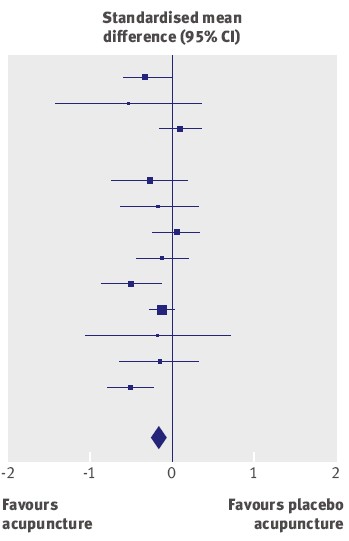
The average effect (the diamond at the bottom) is essentially zero.
It has often been supposed that acupuncture is a theatrical placebo, but because of the placebo effect it produces more pain relief than (non-blind) controls. This study confirms that there is likely to be such an effect, but it also finds that the size of the placebo effect is too small to be useful to patients. Here is the comparison between sham acupuncture and no acupuncture at all.
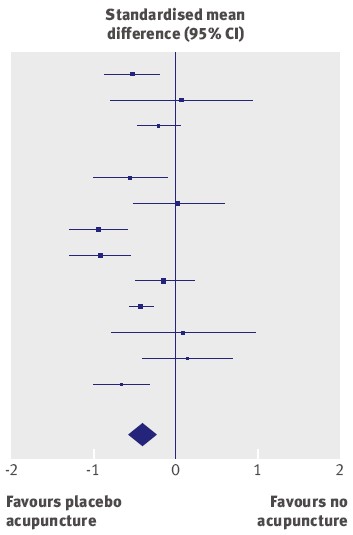
The results of different trials are very variable, but the average effect (diamond at the bottom) favours sham acupuncture over no acupuncture at all.
But how big is the effect? The numbers along the bottom of the graph are ‘standardised mean differences’. The average value of -0.42 (95% confidence limits -0.6 to -0.23) between ‘no acupuncture’ and ‘sham acupuncture’ corresponds to a difference of about 10 points on a 100 point scale. This difference is big enough to be real, in the sense that it isn’t just chance. But is it big enough to be useful to the patient? Probably not. Madsen et al conclude
“a consensus report characterised a 10mm reduction on a 100 mm visual analogue scale as representing a “minimal” change or “little change”. Thus, the apparent analgesic effect of acupuncture seems to be below a clinically relevant pain improvement.”
This makes nonsense of the Pittilo report. Notice that these results, yet again, make nonsense of the proposals in the gamma-minus Pittilo report, to pseudo-regulate acupuncture, and to have degrees in the subject.
Cochrane reviews of Acupuncture : and a bad report from BBC
Two new Cochrane reviews appeared last week, Acupuncture for tension-type headache, and Acupuncture for migraine prophylaxis.
You can’t blame subeditors for the appalling title of the BBC’s report on Acupuncture ‘works for headaches’. The content is pretty misleading too. (The link is to a version saved at 19.35 on 21 January 2009.). Furthermore, like far too many of the BBC reports, it is anonymous. One has no idea to blame This is important, if only because the BBC news site is so influential. Twelve hours after posting the misleading title has been copied all round the world.
In the Guardian, Ian Sample had a much better report, Even’fake’ acupuncture reduces the severity of headaches and migraines. Sadly the print edition had the title “Acupuncture aids migraines, researchers
find”, but that can be blamed on subeditors who have a problem with reading (in fact Sample had seen neither title).
The BBC report seemed to call for a complaint. This is what I sent.
| I wish to complain about the report on acupuncture at http://news.bbc.co.uk/1/hi/health/7838231.stm
The title itself was highly misleading “Acupuncture works for headaches” is precisely the opposite of what was shown, namely that it is no better than sham acupuncture controls. The article goes on to say
It is not said that there isn’t the slightest reason to think this is true (or even means anything) , and that the work which is being reported is strong evidence that it’s not true
That is wrong. University of Salford , for example has just closed its acupuncture course after a number of us have pointed out that it is teaching things that aren’t true
It is exactly the opposite of an endorsement. It is one more nail in the coffin of acupuncture as generally understood. This article, I contend, is partial and misleading. Unfortunately it is anonymous. |
Follow-up
Today’s BBC report on the BMJ paper is almost as partisan as the one that I just complained about. “Confusion on acupuncture benefit ” exaggerates greatly the amount of confusion. Worse still, it quotes only two well-known advocates of acupuncture, people who make their living from it. No independent scientific voice is to be heard.
One of those cited is Adrian White. He is described as “a researcher into acupuncture at the Peninsula Medical School”. There is no mention of the fact that he is also Editor in Chief of the journal Acupuncture in Medicine. The other person who is quoted is Mike O’Farrell, the chief executive of the British Acupuncture Council. What do you expect him to say?
I’ve just sent another complaint, about today’s BBC report. The more the merrier.
The BMJ itself published an editorial on the Madsen paper. It seems very odd that they should have chosen the editors of the BMJ-group journal, Acupuncture in Medicine, to comment on a paper that sounds the death knell for the subject from which they make their living. Needless to say, the editorial attempted to wriggle out of the obvious conclusions. Worse still, the Health editor of the BBC web site referred to the editorial in his defence, in response to my complaint.
Channel 4 News does a lot better than the BBC, or the BMJ editorial, with its report Acupuncture ‘fails to relieve pain’
“Claims that acupuncture can relieve pain have been undermined by the results of a new study.”
“senior researcher Asbjorn Hrobjartsson said: “Our findings question both the traditional foundation of acupuncture…and the prevailing theory that acupuncture has an important effect on pain in general”. “
The Daily Telegraph also, like almost everyone else, did better than the BBC, with “Acupuncture ‘has almost no effect in relieving pain’”
“The pain relieving effects of acupuncture are so small that they may be clinically irrelevant, according to a review of research into the treatment.”
Even Metro, the free London Newspaper, is more accurate then the BBC. They carry a short report “Acupuncture ‘has no medical point’.”
“The pain-relieving effects of acupuncture compared with a placebo are so small they may be clinically irrelevant.”
New review puts in doubt traditional foundation of acupuncture. Believe it or not, that is the title of the report on Madsen et al from the Prince’s Foundation for Integretad Health! Don’t get too excited though. They haven’t even bothered to look at the original paper, but merely cite the dreadful BBC report. Much prominence is given to the acupuncturists, White and O’Farrell, and the important finding isn’t mentioned at all. Another gamma minus.
It’s only a matter of weeks since a lot of young scientists produced a rather fine pamphlet pointing out that the “detox” industry is simply fraud. They concluded
“There is little or no proof that these products work, except to part people from their cash.”
With impeccable timing, Duchy Originals has just launched a “detox” product.
Duchy Originals is a company that was launched in 1990 by the Prince of Wales, Up to now, it has limited itself to selling overpriced and not particularly healthy stuff like Chocolate Butterscotch Biscuits and Sandringham Strawberry Preserve. Pretty yummy if you can afford them.
The move of HRH into herbal concoctions was first noted in the blogosphere (as usual) in December, by Quackometer. It was reported recently in the Daily Telegraph (23rd January).
Expect a media storm.

Aha so it is a “food supplement” not a drug. Perhaps Duchy Originals have not noticed that there are now rather strict regulations about making health claims for foods?
And guess who’s selling it? Yes our old friend, for which no deception is too gross, Boots the Chemists.
That’s £10 for 50 ml. Or £200 per litre.
And what’s in it?

Problem 1. The word detox has no agreed meaning. It is a marketing word, designed to separate the gullible from their money
Problem 2. There isn’t the slightest reason to think that either artichoke or dandelion will help with anything at all. Neither appears at all in the Cochrane reviews. So let’s check two sources that are both compiled by CAM sympathisers (just so I can’t be accused of prejudice).
National Electronic Library of CAM (NELCAM) reveals nothing useful.
- There is no good evidence that artichoke leaf extract works for lowering cholesterol. No other indications are mentioned.
- Dandelion doesn’t get any mention at all.
The US National Center for Complementary and Alternative Medicine (NCCAM) has spent almost $1 billion on testing alternative treatments So far they have produced no good new remedies (see also Integrative baloney @ Yale).They publish a database of knowledge about herbs. This is what they say.
- Dandelion. There is no compelling scientific evidence for using dandelion as a treatment for any medical condition.
- Artichoke isn’t even mentioned anywhere.
If “detox” is meant to be a euphemism for hangover cure, then look at the review by Pittler et al (2005), ‘Interventions for preventing or treating alcohol hangover: systematic review of randomised controlled trials’.
“Conclusion No compelling evidence exists to suggest that any conventional or complementary intervention is effective for preventing or treating alcohol hangover. The most effective way to avoid the symptoms of alcohol induced hangover is to practise abstinence or moderation.”
Problem 3. The claim that the product is “cleansing and purifying” is either meaningless or false. Insofar as it is meaningless, it is marketing jargon that is designed to deceive. The claim that it supports “the body’s natural elimination and detoxification processes, and helps maintain healthy digestion” is baseless. It is a false health claim that, prima facie, is contrary to the Unfair Trading law, and/or European regulation on nutrition and health claims made on food, ref 1924/2006 , and which therefore should result in prosecution.
Two more Duchy herbals
Duchy are selling also Echinacea and Hypericum (St John’s Wort).
The evidence that Echinacea helps with colds is, to put it mildly, very marginal.
Of St John’s Wort, NCCAM says
“There is some scientific evidence that St. John’s wort is useful for treating mild to moderate depression. However, two large studies, one sponsored by NCCAM, showed that the herb was no more effective than placebo in treating major depression of moderate severity.”
As well as having dubious effectiveness it is well known that St John’s Wort can interact with many other drugs, a hazard that is not mentioned by Duchy Originals
These two are slightly different because they appear to have the blessing of the MHRA.
The behaviour of the MHRA in ignoring the little question of whether the treatment works or not has been condemned widely. But at least the MHRA are quite explicit. This is what the MHRA says of St. John’s Wort (my emphasis).
“This registration is based exclusively upon evidence of traditional use of Hypericum perforatum L. as a herbal medicine and not upon data generated from clinical trials.. There is no requirement under the Traditional Herbal Registration scheme to prove scientifically that the product works.“
But that bit about “There is no requirement under the Traditional Herbal Registration scheme to prove scientifically that the product works” does not appear in the Duchy Originals advertisement. On the contrary, this is what they say.

Yes, they claim that “the two tinctures [echinacea and hypericum] -in terms of their safety, quality and efficacy -by the UK regulatory authorities”
That is simply not true.
On the contrary, anyone without specialist knowledge would interpret bits like these as claims that there will be a health benefit.
![]()
That is claim to benefit your health. So are these.

Who makes them?

Michael McIntyre is certainly a high profile herbalist.
He was founder president of the European Herbal Practitioners Association and a trustee of the Prince of Wales’s Foundation for Integrated Medicine. It seems that he a great believer in the myth of “detox”, judging by his appearance on the Firefly tonics web site. They will sell you
“Natural healthy energy” in a drink
That’s what we wanted…
A Wake up for that drowsy afternoon… Detox for a dodgy Friday morning…
Sharpen up for that interminable meeting.
We left the herbs to our wonderful herbalists.
Their De-tox contains lemon, lime, ginger, sarsparilla and angelica. I expect it tastes nice. All the rest is pure marketing rubbish. It does not speak very well of Michael McIntyre that he should lend his name to such promotions.
Nelsons, who actually make the stuff, is better known as a big player in the great homeopathic fraud business. They will sell you 30C pills of common salt at £4.60 for 84. Their main health-giving virtue is that they’re salt free.
If you want to know what use they are, you are referred here, where it is claimed that it is “used to treat watery colds, headaches, anaemia, constipation, and backache”. Needless to say there isn’t a smidgeon of reason to believe it does the slightest good for them.
And remember what Nelson’s advisor at their London pharmacy told BBC TV while recommending sugar pills to prevent malaria?
“They make it so your energy doesn’t have a malaria-shaped hole in it so the malarial mosquitos won’t come along and fill that in.”
You couldn’t make it up.
The Prince of Wales has some sensible things to say in other areas, such as the world’s over-reliance on fossil fuels. Even his ideas about medicine are, no doubt, well-intentioned. It does seem a shame that he just can’t get the hang of the need for evidence. Wishful thinking just isn’t enough.
Follow-up
Some more interesting reading about the Prince of Wales.
Michael Baum’s An open letter to the Prince of Wales: with respect, your highness, you’ve got it wrong”
Gerald Weissman’s essay Homeopathy: Holmes, Hogwarts, and the Prince of Wales.
Channel 4 TV documentary HRH “meddling in politics”
11 March 2009 The MHRA have censured Duchy Originals for the claims made for these products. and in May 2009, two complaints to the Advertising Standards Authority were upheld.
Congratulations to the vice-chancellor of the University of Salford, Michael Harloe.
Times Higher Education announced on 15th January 2009 Salford to shut complementary medicine BSc.
“The University of Salford is to stop offering undergraduate degrees in acupuncture and complementary medicine because they are no longer considered “a sound academic fit”.”
This is the first time that a University has decided to stop teaching quackery altogether. The university’s press officer told me (22 January 2009)
| “all the University’s programmes associated with complementary medicine within the School of Community, Health Sciences & Social Care will be run out. This includes the Homeopathy in Practice programme. “ |
| Salford, before it became a university, was home to the great L.S. Lowry |
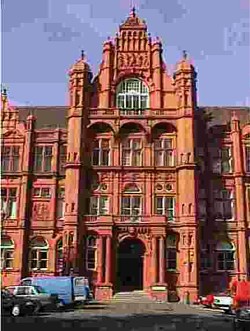
Salford’s Peel building, where L.S.Lowry worked |
“Managers concluded last year that the BSc traditional Chinese medicine and other degrees with a complementary medicine element “cannot really be held to be a good fit with the strategic direction of the school, and resource and energy would be better directed elsewhere”.
There are more than 70 students registered on the Chinese medicine degree course.
The university will continue to offer these subjects at postgraduate level, as short courses and as part of continuing professional development programmes. Traditional Chinese medicine work will also be linked to the university’s allied
health professions courses.”
Another report appeared in the Manchester Evening News: “Needle over acupuncture course”. “A UNIVERSITY has scrapped a course in acupuncture and aromatherapy branded `anti-science’ by critics.
Salford University said the three-year degree in traditional Chinese medicine didn’t fit with the `strategic direction’ bosses want to adopt.
The move is part of wider cuts which will see 150 teaching and support staff jobs axed.”
One of their students raised the question that the university must dread.
“First-year student Gary Leese, who is organising a petition, said: “Why did the university launch the course if they didn’t think it was good enough?”
The comments left by the readers of the Manchester Evening News were mostly very sensible. The first to come in, from someone with the beautifully Lancastrian name, Gladys Rowbotham, said “Some common sense at last!”.
A brief report appeared also in the Manchester Confidential
Why now?
This is rather an interesting development. On 19th April 2007, I sent a Freedom of Information request to Salford to ask for course validation documents for their courses in Homeopathy and in Traditional Chinese Medicine. I also asked for course materials for specified courses. This request was even less successful than usual. Not only were the course materials refused (as they always are), but, unusually, the validation documents were refused too. The excuse for this was more pathetic than usual too. They claimed it would cost more than £450 to email a few documents and powerpoints, and claimed exemption under Section 21 of the Freedom of Information Act, “Information Reasonably Accessible to the Applicant by Other Means”, rather than the more usual excuse (Section 43, “Commercial interests”).
It was never explained what “other means” were meant to be available. Perhaps they thought I should pay £3000 in fees and enrol for the course?
On 6th April 2007, Times Higher Education (THE) ran an opinion piece “Credible endeavour or pseudoscience?“. In this, I wrote, as follows.
“Clearly the buck stops with university vice-chancellors who award the degrees. Two weeks ago, after the publication of my opinion article and a special report on university homoeopathy courses in the journal Nature , the BBC tried to get one of the vice-chancellors to defend themselves. They did not succeed. Letters to vice-chancellors on this go unanswered. Requests to see course materials have repeatedly been refused. The QAA is exempt from the Freedom of Information Act. Teaching materials and the names of examiners are kept secret. This I find incomprehensible and indefensible.”
After this appeared, I was sent by the University of Salford a copy of Michael Harloe’s defence of their position at that time, as sent to THE. It relied heavily on validation by the Quality Assurance Agency. But the QAA is merely a box-ticking organisation that would give top marks to a course in astrology, given a sufficient mound of paperwork, as I pointed out in Nature, “Their own rules prevent them from doing anything useful”.
The statement also said that the courses teach critical thinking about alternative medicine. But it has been pointed out over and over again that what alternative medicine advocates lack, above anything else, is any faculty of critical self-appraisal.
One has to have some sympathy with a vice chancellor who is put on the spot and forced to defend courses in which he probably does not really believe himself. Perhaps it is not surprising that letters so often go unanswered. What can they say? There really is no answer that doesn’t leave the hapless VC with egg on his face.
If there is one lesson from this, it is not to be discouraged if you get no answer from a vice-chancellor. It has probably been read and may well get acted on eventually. Shutting down a course is no easy matter. It takes time.
I said the buck stops with the vice chancellor. Professor Harloe has grasped the nettle and done the right thing. Let’s hope a few more now follow his excellent lead..
What does this mean for the Pittilo report?
The gamma-minus Pittilo report (see also. The Times) recommended more degrees in alternative medicine, but there seems to be something of a trend developing in exactly the opposite direction.
The University of Central Lancashire has closed the first year entry to its “BSc” in Homeopathy, and announced a review of all its activities in the area of alternative medicine. Now we have Salford. There are stirrings among the good scientists even at the University of Westminster which has a new Dean and VC.
This rather absurd situation has arisen because of the adamant refusal of the government, and of a dozen or more quangos, to grasp the nettle of whether or not the alternative treatments work. Time and time again, the one important question that you want to know about any sort of treatment, namely, is it effective, has been pushed under the carpet.
The sort of absurd political correctness that leads to the fraudulent conjurers known as ‘psychic surgeons’ being referred to as a “profession” by the Department of Health has obscured reality. Even the MHRA was persuaded to allow misleading labelling of homeopathic and herbal “remedies”. thus betraying its job. In its own words “The MHRA is the government agency that is responsible for ensuring that medicines and medical devices work, . . .”.
There is a lesson here. You can’t go on avoiding reality for ever. One consolation is that, in the end, it is the universities who are leading the way, albeit slowly.
All we need now is for the Department of Health, the MHRA and the endless box-ticking quangos to wake up too.
| One of the most extraordinary bits of journalism I’ve read for a long time appeared as an editorial in the Sri Lankan newspaper, the Sunday Leader, on Sunday January 11th 2009 It was reproduced in the Guardian on 13th January, and in The Times. It was written by Lasantha Wickrematunge, editor of the Sunday Leader, and it was the last thing he wrote. Days after writing it he was assassinated. | 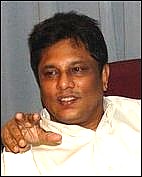 |
It is a plea for freedom of speech. In particular, for the freedom of journalists to tell the truth, It is deeply moving and it is also written in more beautiful English than many native speakers can manage. The second person to leave a comment in the Guardian said
“Extraordinary, humbling and deeply moving.
Cif Eds, please leave this at the top of the page for about a week, and then nail copies it to every available surface at Guardian HQ.”
Writing blogs like this one (and a thousand others) need some of the skills of investigative journalism. Those skills are not so different from those you need in science, Curiosity, a willingness to look under stones, a preference for truth over myth, some skill with Google and a good deal of tenacity. You also need to be resilient to abuse and defamation by people who disagree with you. But you do not risk your life. It does not take much courage. That isn’t true in large parts of the world.
Read it all. Here are a few quotations to persuade you it’s worth the time.
“No other profession calls on its practitioners to lay down their lives for their art save the armed forces – and, in Sri
Lanka , journalism. In the course of the last few years, the independent media have increasingly come under attack. Electronic and print institutions have been burned, bombed, sealed and coerced. Countless journalists have been harassed, threatened and killed. It has been my honour to belong to all those categories, and now especially the last.”“The Sunday Leader has been a controversial newspaper because we say it like we see it: whether it be a spade, a thief or a murderer, we call it by that name. We do not hide behind euphemism. The investigative articles we print
are supported by documentary evidence thanks to the public-spiritedness of citizens who at great risk to themselves pass on this material to us. We have exposed scandal after scandal, and never once in these 15 years has anyone proved us wrong or successfully prosecuted us.”“The free media serve as a mirror in which the public can see itself sans mascara and styling gel. From us you learn the state of your nation, and especially its management by the people you elected to give your children a better future.”
“It is well known that I was on two occasions brutally assaulted, while on another my house was sprayed with machine-gun fire. Despite the government’s sanctimonious assurances, there was never a serious police inquiry into the perpetrators of these attacks, and the attackers were never apprehended.
In all these cases, I have reason to believe the attacks were inspired by the government. When finally I am killed, it will be the government that kills me.”
“In the wake of my death I know you will make all the usual sanctimonious noises and call upon the police to hold a swift and thorough inquiry.
But like all the inquiries you have ordered in the past, nothing will come of this one, too. For truth be told, we both know who will be behind my death, but dare not call his name. Not just my life but yours too depends on it.
As for me, I have the satisfaction of knowing that I walked tall and bowed to no man. And I have not travelled this journey alone. Fellow journalists in other branches of the media walked with me: most are now dead, imprisoned
without trial or exiled in far-off lands.”“People often ask me why I take such risks and tell me it is a matter of time before I am bumped off. Of course I know that: it is inevitable. But if we do not speak out now, there will be no one left to speak for those who cannot,
whether they be ethnic minorities, the disadvantaged or the persecuted. An example that has inspired me throughout my career in journalism has been that of the German theologian, Martin Niemöller. In his youth he was an antisemite and an admirer of Hitler. As nazism took hold of Germany, however, he saw nazism for what it was. It was not just the Jews Hitler sought to extirpate, it was just about anyone with an alternate point of view. Niemöller spoke out, and for his trouble was incarcerated in the Sachsenhausen and Dachau concentration camps from 1937 to 1945, and very nearly executed. While incarcerated, he wrote a poem that, from the first time I read it in my teenage years, stuck hauntingly in my mind:
First they came for the Jews
and I did not speak out because I was not a Jew.Then they came for the Communists
and I did not speak out because I was not a Communist.Then they came for the trade unionists
and I did not speak out because I was not a trade unionist.Then they came for me and there was no one left to speak out for me.
If you remember nothing else, let it be this: the Leader is there for you, be you Sinhalese, Tamil, Muslim, low-caste, homosexual, dissident or disabled.”
This man puts to shame the those who won’t speak out in the safety of the West, despite the fact that they have nothing to lose but their ministerial jobs or their knighthoods. Or running the risk of being sued by chiropractors.
How about some nominations for Western journalists who live up to these ideals? I’d start with Seymour Hersh and Paul Krugman in the USA, and our own Ben Goldacre. It’s interesting though, that two of these three are not full time journalists. Blogs do rather better than most newspapers. They have become an important force for freedom of speech. That more than counterbalances the use of the web for promoting junk. It is a lot harder to keep a secret than it used to be.
There is an obituary of Lasantha Wickrematunge in the Sunday Leader, and a report from Amnesty International.
I’m perfectly happy to think of alternative medicine as being a voluntary, self-imposed tax on the gullible (to paraphrase Goldacre again). But only as long as its practitioners do no harm and only as long as they obey the law of the land. Only too often, though, they do neither.
When I talk about law, I don’t mean lawsuits for defamation. Defamation suits are what homeopaths and chiropractors like to use to silence critics. heaven knows, I’ve becomes accustomed to being defamed by people who are, in my view. fraudsters, but lawsuits are not the way to deal with it.
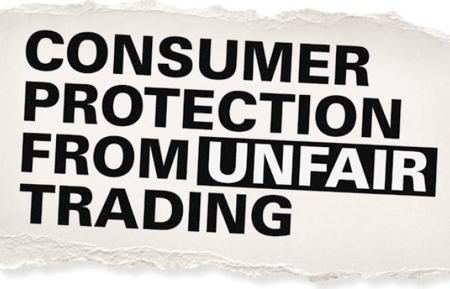
I’m talking about the Trading Standards laws Everyone has to obey them, and in May 2008 the law changed in a way that puts the whole health fraud industry in jeopardy.
The gist of the matter is that it is now illegal to claim that a product will benefit your health if you can’t produce evidence to justify the claim.
I’m not a lawyer, but with the help of two lawyers and a trading standards officer I’ve attempted a summary. The machinery for enforcing the law does not yet work well, but when it does, there should be some very interesting cases.
The obvious targets are homeopaths who claim to cure malaria and AIDS, and traditional Chinese Medicine people who claim to cure cancer.
But there are some less obvious targets for prosecution too. Here is a selection of possibilities to savour..
- Universities such as Westminster, Central Lancashire and the rest, which promote the spreading of false health claims
- Hospitals, like the Royal London Homeopathic Hospital, that treat patients with mistletoe and marigold paste. Can they produce any real evidence that they work?
- Edexcel, which sets examinations in alternative medicine (and charges for them)
- Ofsted and the QCA which validate these exams
- Skills for Health and a whole maze of other unelected and unaccountable quangos which offer “national occupational standards” in everything from distant healing to hot stone therapy, thereby giving official sanction to all manner of treatments for which no plausible evidence can be offered.
- The Prince of Wales Foundation for Integrated Health, which notoriously offers health advice for which it cannot produce good evidence
- Perhaps even the Department of Health itself, which notoriously referred to “psychic surgery” as a profession, and which has consistently refused to refer dubious therapies to NICE for assessment.
The law, insofar as I’ve understood it, is probably such that only the first three or four of these have sufficient commercial elements for there to be any chance of a successful prosecution. That is something that will eventually have to be argued in court.
But lecanardnoir points out in his comment below that The Prince of Wales is intending to sell herbal concoctions, so perhaps he could end up in court too.
The laws
We are talking about The Consumer Protection from Unfair Trading Regulations 2008. The regulations came into force on 26 May 2008. The full regulations can be seen here, or download pdf file. They can be seen also on the UK Statute Law Database.
The Office of Fair Trading, and Department for Business, Enterprise & Regulatory Reform (BERR) published Guidance on the Consumer Protection from Unfair Trading Regulations 2008 (pdf file),
Statement of consumer protection enforcement principles (pdf file), and
The Consumer Protection from Unfair Trading Regulations: a basic guide for business (pdf file).
Has The UK Quietly Outlawed “Alternative” Medicine?
On 26 September 2008, Mondaq Business Briefing published this article by a Glasgow lawyer, Douglas McLachlan. (Oddly enough, this article was reproduced on the National Center for Homeopathy web site.)
“Proponents of the myriad of forms of alternative medicine argue that it is in some way “outside science” or that “science doesn’t understand why it works”. Critical thinking scientists disagree. The best available scientific data shows that alternative medicine simply doesn’t work, they say: studies repeatedly show that the effect of some of these alternative medical therapies is indistinguishable from the well documented, but very strange “placebo effect” ”
“Enter The Consumer Protection from Unfair Trading Regulations 2008(the “Regulations”). The Regulations came into force on 26 May 2008 to surprisingly little fanfare, despite the fact they represent the most extensive modernisation and simplification of the consumer protection framework for 20 years.”
The Regulations prohibit unfair commercial practices between traders and consumers through five prohibitions:-
- General Prohibition on Unfair Commercial
Practices (Regulation 3)- Prohibition on Misleading Actions (Regulations 5)
- Prohibition on Misleading Omissions (Regulation 6)
- Prohibition on Aggressive Commercial Practices (Regulation 7)
- Prohibition on 31 Specific Commercial Practices that are in all Circumstances Unfair (Schedule 1). One of the 31 commercial practices which are in all circumstances considered unfair is “falsely claiming that a product is able to cure illnesses, dysfunction or malformations”. The definition of “product” in the Regulations includes services, so it does appear that all forms medical products and treatments will be covered.
Just look at that!
| One of the 31 commercial practices which are in all circumstances considered unfair is “falsely claiming that a product is able to cure illnesses, dysfunction or malformations” |
Section 5 is equally powerful, and also does not contain the contentious word “cure” (see note below)
Misleading actions
5.—(1) A commercial practice is a misleading action if it satisfies the conditions in either paragraph (2) or paragraph (3).
(2) A commercial practice satisfies the conditions of this paragraph—
(a) if it contains false information and is therefore untruthful in relation to any of the matters in paragraph (4) or if it or its overall presentation in any way deceives or is likely to deceive the average consumer in relation to any of the matters in that paragraph, even if the information is factually correct; and
(b) it causes or is likely to cause the average consumer to take a transactional decision he would not have taken otherwise.
These laws are very powerful in principle, But there are two complications in practice.
One complication concerns the extent to which the onus has been moved on to the seller to prove the claims are true, rather than the accuser having to prove they are false. That is a lot more favourable to the accuser than before, but it’s complicated.
The other complication concerns enforcement of the new laws, and at the moment that is bad.
Who has to prove what?
That is still not entirely clear. McLachlan says
“If we accept that mainstream evidence based medicine is in some way accepted by mainstream science, and alternative medicine bears the “alternative” qualifier simply because it is not supported by mainstream science, then where does that leave a trader who seeks to refute any allegation that his claim is false?
Of course it is always open to the trader to show that his the alternative therapy actually works, but the weight of scientific evidence is likely to be against him.”
On the other hand, I’m advised by a Trading Standards Officer that “He doesn’t have to refute anything! The prosecution have to prove the claims are false”. This has been confirmed by another Trading Standards Officer who said
“It is not clear (though it seems to be) what difference is implied between “cure” and “treat”, or what evidence is required to demonstrate that such a cure is false “beyond reasonable doubt” in court. The regulations do not provide that the maker of claims must show that the claims are true, or set a standard indicating how such a proof may be shown.”
The main defence against prosecution seems to be the “Due diligence defence”, in paragraph 17.
Due diligence defence
17. —(1) In any proceedings against a person for an offence under regulation 9, 10, 11 or 12 it is a defence for that person to prove—
(a) that the commission of the offence was due to—
(i) a mistake;
(ii) reliance on information supplied to him by another person;
(iii) the act or default of another person;
(iv) an accident; or
(v) another cause beyond his control; and
(b) that he took all reasonable precautions and exercised all due diligence to avoid the commission of such an offence by himself or any person under his control.
If “taking all reasonable precautions” includes being aware of the lack of any good evidence that what you are selling is effective, then this defence should not be much use for most quacks.
Douglas McLachlan has clarified, below, this difficult question
False claims for health benefits of foods
A separate bit of legislation, European regulation on nutrition and health claims made on food, ref 1924/2006, in Article 6, seems clearer in specifying that the seller has to prove any claims they make.
Article 6
Scientific substantiation for claims
1. Nutrition and health claims shall be based on and substantiated by generally accepted scientific evidence.
2. A food business operator making a nutrition or health claim shall justify the use of the claim.
3. The competent authorities of the Member States may request a food business operator or a person placing a product on the market to produce all relevant elements and data establishing compliance with this Regulation.
That clearly places the onus on the seller to provide evidence for claims that are made, rather than the complainant having to ‘prove’ that the claims are false.
On the problem of “health foods” the two bits of legislation seem to overlap. Both have been discussed in “Trading regulations and health foods“, an editorial in the BMJ by M. E. J. Lean (Professor of Human Nutrition in Glasgow).
“It is already illegal under food labelling regulations (1996) to claim that food products can treat or prevent disease. However, huge numbers of such claims are still made, particularly for obesity ”
“The new regulations provide good legislation to protect vulnerable consumers from misleading “health food” claims. They now need to be enforced proactively to help direct doctors and consumers towards safe, cost effective, and evidence based management of diseases.”
In fact the European Food Standards Agency (EFSA) seems to be doing a rather good job at imposing the rules. This, predictably, provoked howls of anguish from the food industry There is a synopsis here.
“Of eight assessed claims, EFSA’s Panel on Dietetic Products, Nutrition and Allergies (NDA) rejected seven for failing to demonstrate causality between consumption of specific nutrients or foods and intended health benefits. EFSA has subsequently issued opinions on about 30 claims with seven drawing positive opinions.”
“. . . EFSA in disgust threw out 120 dossiers supposedly in support of nutrients seeking addition to the FSD’s positive list.
If EFSA was bewildered by the lack of data in the dossiers, it needn’t hav been as industry freely admitted it had in many cases submitted such hollow documents to temporarily keep nutrients on-market.”
Or, on another industry site, “EFSA’s harsh health claim regime”
“By setting an unworkably high standard for claims substantiation, EFSA is threatening R&D not to mention health claims that have long been officially approved in many jurisdictions.”
Here, of course,”unworkably high standard” just means real genuine evidence. How dare they ask for that!
Enforcement of the law
Article 19 of the Unfair Trading regulations says
19. —(1) It shall be the duty of every enforcement authority to enforce these Regulations.
(2) Where the enforcement authority is a local weights and measures authority the duty referred to in paragraph (1) shall apply to the enforcement of these Regulations within the authority’s area.
Nevertheless, enforcement is undoubtedly a weak point at the moment. The UK is obliged to enforce these laws, but at the moment it is not doing so effectively.
A letter in the BMJ from Rose & Garrow describes two complaints under the legislation in which it appears that a Trading Standards office failed to enforce the law. They comment
” . . . member states are obliged not only to enact it as national legislation but to enforce it. The evidence that the government has provided adequate resources for enforcement, in the form of staff and their proper training, is not convincing. The media, and especially the internet, are replete with false claims about health care, and sick people need protection. All EU citizens have the right to complain to the EU Commission if their government fails to provide that protection.”
This is not a good start. A lawyer has pointed out to me
“that it can sometimes be very difficult to get Trading Standards or the OFT to take an interest in something that they don’t fully understand. I think that if it doesn’t immediately leap out at them as being false (e.g “these pills cure all forms of cancer”) then it’s going to be extremely difficult. To be fair, neither Trading Standards nor the OFT were ever intended to be medical regulators and they have limited resources available to them. The new Regulations are a useful new weapon in the fight against quackery, but they are no substitute for proper regulation.”
Trading Standards originated in Weights and Measures. It was their job to check that your pint of beer was really a pint. Now they are being expected to judge medical controversies. Either they will need more people and more training, or responsibility for enforcement of the law should be transferred to some more appropriate agency (though one hesitates to suggest the MHRA after their recent pathetic performance in this area).
Who can be prosecuted?
Any “trader”, a person or a company. There is no need to have actually bought anything, and no need to have suffered actual harm. In fact there is no need for there to be a complainant at all. Trading standards officers can act on their own. But there must be a commercial element. It’s unlikely that simply preaching nonsense would be sufficient to get you prosecuted, so the Prince of Wales is, sadly, probably safe.
Universities who teach that “Amethysts emit high Yin energy” make an interesting case. They charge fees and in return they are “falsely claiming that a product is able to cure illnesses”.
In my view they are behaving illegally, but we shan’t know until a university is taken to court. Watch this space.
The fact remains that the UK is obliged to enforce the law and presumably it will do so eventually. When it does, alternative medicine will have to change very radically. If it were prevented from making false claims, there would be very little of it left apart from tea and sympathy
Follow-up
New Zealand must have similar laws.
Just as I was about to post this I found that in New Zealand a
“couple who sold homeopathic remedies claiming to cure bird flu, herpes and Sars (severe acute respiratory syndrome) have been convicted of breaching the Fair Trading Act.”
They were ordered to pay fines and court costs totalling $23,400.
A clarification form Douglas McLachlan
On the difficult question of who must prove what, Douglas McLachlan, who wrote Has The UK Quietly Outlawed “Alternative” Medicine?, has kindly sent the following clarification.
“I would agree that it is still for the prosecution to prove that the trader committed the offence beyond a reasonable doubt, and that burden of proof is always on the prosecution at the outset, but I think if a trader makes a claim regarding his product and best scientific evidence available indicates that that claim is false, then it will be on the trader to substantiate the claim in order to defend himself. How will the trader do so? Perhaps the trader might call witness after witness in court to provide anecdotal evidence of their experiences, or “experts” that support their claim – in which case it will be for the prosecution to explain the scientific method to the Judge and to convince the Judge that its Study evidence is to be preferred.
Unfortunately, once human personalities get involved things could get clouded – I could imagine a small time seller of snake oil having serious difficulty, but a well funded homeopathy company engaging smart lawyers to quote flawed studies and lead anecdotal evidence to muddy the waters just enough for a Judge to give the trader the benefit of the doubt. That seems to be what happens in the wider public debate, so it’s easy to envisage it happening a courtroom.”
The “average consumer”.
(3) A commercial practice is unfair if—
(a) it contravenes the requirements of professional diligence; and
(b) it materially distorts or is likely to materially distort the economic behaviour of the average consumer with regard to the product.
It seems,therefore, that what matters is whether the “average consumer” would infer from what is said that a claim was being made to cure a disease. The legal view cited by Mojo (comment #2, below) is that expressions such as “can be used to treat” or “can help with” would be considered by the average consumer as implying successful treatment or cure.
The drugstore detox delusion. A nice analysis “detox” at .Science-based Pharmacy
Sense about Science have just produced a rather good pamphlet that exposes, yet again. the meaningless marketing slogan “detox”. You can download the pamphlet from their web site.
The pamphlet goes through the claims of eleven products. Needless to say, the claims are either meaningless, or simply untrue.
- Garnier Clean Detox Anti-Dullness Foaming Gel
“Detoxifies by cleansing the skin’s surface” - MG Detox Shampoo Trevor Sorbie
“Deep cleansing and clarifying shampoo” - Boots Detox Body Brush
“Ritualistic body brushing helps expel toxins through the skin” - Innocent Natural Detox Smoothie
“Helps neutralise nasty free radicals which can cause damage to your body’s cells” - Vitabiotics Detoxil 15 day support
“Helps the body cleanse itself of toxins and pollutants caused by the excesses of a busy life” - V-Water Detox
“Cleanse your system and whisk away the polluting nasties” - 4321 Shape Up and Detox
“To drain off water and toxins” and “purify the body” - Boots Detox 5 Day Plan
Works “in harmony with your body to flush away toxins” - Farmacia Spa Therapy Detox range
To “rid your body of these damaging toxins” - Crystal Spring Detox patches
“I’m the easy way to detox, just put me on one foot at night and take me off in the morning” - Fushi Holistic and Health Solutions Total Detox Patch
“it acts as a toxin sink and absorbs impurities through your feet”
One nice thing about the pamphlet is that each item is written by a young scientist (including my close neighbour, Daniella Muallem). They are all people at an early stage in their career, but they care enough to spend time dissecting the rubbish spread by companies in order to part you from your money.
Garnier, it’s true, is a cosmetics company, so one expects nothing but lies You won’t be disappointed on that score.
That least ethical of pharmaceutical companies, Boots, appears twice The Boots Detox Body Brush is reviewed by a young chemist, Tom Wells. It turns out (there’s a surprise) to be nothing more than an ordinary stiff brush. It seems that Boots’ definition of “detox”, for this purpose, is “removing dead skin cells” A totally shameless con, in other words.
The Boots Detox 5 day plan consists if 5 phials of apple or strawberry flavoured goo containing two vitamins and one mineral, mixed with glycerol. In this case the young investigator, Evelyn Harvey, elicited a quite remarkable response from Boots.
Well, have you tested the effects of that diet, with or without the detox product? Does the ‘goo’ stuff [the drink which forms part of the plan] add anything extra?
Well, it’s meant to kick start it.
But has is been tested like that?
No.
Ok, I’m thinking I’ll just try a healthy diet for a week, a bit more exercise, and not bother with buying the detox.
Yes, that sounds like a better idea, to be honest I’d never do this myself.
The media coverage
The Radio 4 Today programme interviewed Ben Goldacre and the managing director of yet another product “Detox in a box” (following their usual policy of equal time for the Flat Earth Society). Listen to the mp3. When Ben Goldacre asked the MD for evidence for the claim made on the web site of Detox in a box, that their diet could remove cadmium from the body, it was denied explicitly that any such claim had been made.
Not so.

But by 10.02 the site had already changed
![]()
So no apology for the mistake. Just a sneaky removal of a few words.
That seems to be the only change though. All the rest of the nutribollocks is still there. For example

There isn’t the slightest reason to believe that it will “improve our immune function”.
There isn’t the slightest reason to think that scavenging free radicals would do you any good, even if it happened.
There isn’t the slightest reason to think it will strengthen body’s fight against cancer cells (that looks like a breach of the Cancer Act to me).
“Cleansing mucous” doesn’t mean much, but whatever it is there isn’t any reason to think its true.
“Purify our blood”. Total meaningless bollocks. The words mean nothing at all. I’ve been here before.
Ben Goldacre’s own account is here “The barefaced cheek of these characters will never cease to amaze and delight me.”
The BBC web site does a good job too.
The Guardian gives an excellent account (James Randerson).
The Daily Mail writes “Detox diets to kick-start the New Year are a ‘total waste of money’ “.
Medical News Today write “Debunking The Detox Myth“.
The Daily Telegraph disgraces itself by not only failing to carry a decent account of the item, but it does run an article on “Detox holidays: New year, new you“. Mega-expensive holidays for the mega-stupid (not to mention the capital letter after the colon).
The Daily Mash provides a bit of cognate fun with “BRITAIN SIGNS UP FOR VORDERMAN’S 28-DAY PISS-DRINK DETOX“. That alludes to “Carol Vorderman’s 28-Day Detox Diet”. A woman who got an enormous salary for playing a parlour game on TV, and has done some good for maths education, is reduced to promoting nonsense for yet more money.
As Clive James pointed out, it’s a but like watching George Clooney advertising coffee for, of all unethical companies, Nestlé. They really look very silly.
Follow-up
Evening Standard 6th January. Nick Cohen writes “Give up detox – it’s bad for your health”
“Giving up on detox should not be painful, however. On the contrary, it should e a life-enhancing pleasure.”
The Times. rather later (January 18th) had a lovely one, “Detox
Debunked“, by the inimitable Ben Goldacre, His account of /detox; as a quasi-religious ‘cleansing ritual’, is spot on.
The National Health Executive (“the Independent Journal for Senior Health Service Managers) asked for an article about quackery. This is a version of that article with live links.
Download the pdf version.
There is a Russian translation here (obviously I can’t vouch for its accuracy).
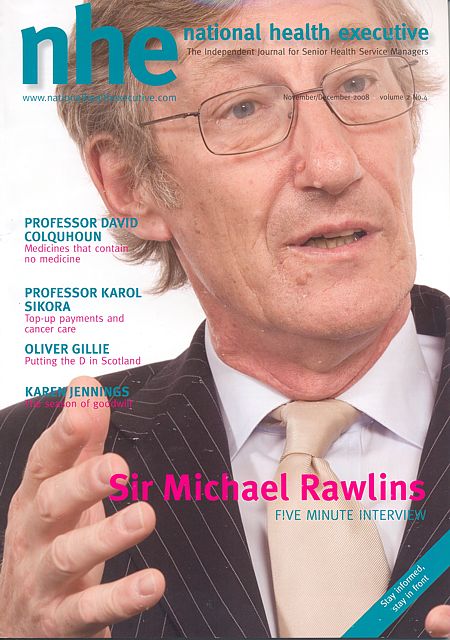
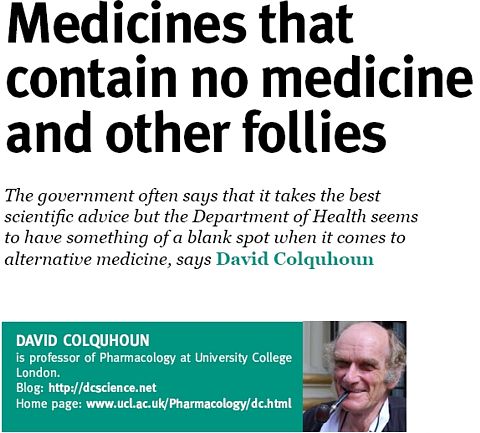
On May 23 th 2006 a letter was sent to the chief executives of 467 NHS Trusts. It was reported as a front page story in the Times, and it was the lead item on the Today programme. The letter urged the government not to spend NHS funds on “unproven and disproved treatments”. Who can imagine anything more simple and self-evident than that? But in politics nothing is simple.
It turns out that quite a lot of patients are deeply attached to unproven and disproved treatments. They clamour for them and, since “patient choice” is high on the agenda at the moment, they quite often get them. Unproven and disproved treatments cost quite a lot of money that the NHS should be spending on things that work.
In January 2007, the Association of Directors of Public Health issued its own list of unproven and disproved treatments. It included, among others, tonsillectomy and adenoidectomy, carpal tunnel surgery and homeopathy. They all matter, but here I’ll concentrate on alternative treatments, of which homeopathy is one of the most widespread.
It should be simple. We have a good mechanism for deciding which treatments are cost-effective, in the form of the National Institute for Clinical Excellence (NICE). If homeopathy and herbalism are not good ways to spend NHS money, why has NICE not said so? The answer to that is simple. NICE has not been asked. It can consider only those questions that are referred to it by the Department of Health (DoH).
The government often says that it takes the best scientific advice, but the DoH seems to have something of a blank spot when it comes to alternative medicine. Nobody knows why. Perhaps it is the dire lack of anyone with a scientific education in government. Or could there be something in the rumour that the DoH lives in terror of being at the receiving end of a rant from the general direction of Clarence House if it doesn’t behave? Whatever the reason, the matter has still not been referred to NICE, despite many requests to do so.
A judgement from NICE would be useful, but it is hardly essential. It isn’t hard to understand. At its simplest the whole problem can be summed up very briefly.
- Homeopathy: giving patients medicines that contain no medicine whatsoever.
- Herbal medicine: giving patients an unknown dose of a medicine, of unknown effectiveness and unknown safety.
- Acupuncture: a rather theatrical placebo, with no real therapeutic benefit in most if not all cases.
- Chiropractic: an invention of a 19 th century salesmen, based on nonsensical principles, and shown to be no more effective than other manipulative therapies, but less safe.
- Reflexology: plain old foot massage, overlaid with utter nonsense about non-existent connections between your feet and your thyroid gland.
- Nutritional therapy: self-styled ‘nutritionists’ making unjustified claims about diet to sell unnecessary supplements.
Of these, ‘nutritional therapy’, or ‘nutritional medicine’, is a relative newcomer. At their worst, they claim that Vitamin C can cure AIDS, and have been responsible for many deaths in Africa. There isn’t the slightest need for them since the nutrition area is already covered by registered dietitians who have far better training.
There have been several good honest summaries of the evidence that underlies these interpretations, written in a style quite understandable by humanities graduates. Try, for example, Trick or Treatment (Singh & Ernst, Bantam Press 2008): a copy should be presented to every person in the DoH and every NHS manager. In some areas the evidence is now quite good. Homeopathy, when tested properly, comes out no different from placebo. That is hardly surprising because the ‘treatment’ pill contains no medicine so it is the same as the placebo pill.
Acupuncture has also been tested well in the last 10 years. A lot of ingenuity has been put into designing sham acupuncture to use as a control. There is still a bit of doubt in a few areas, but overwhelmingly the results show that real acupuncture is not distinguishable from sham. Acupuncture, it seems, is nothing more than a particularly theatrical placebo. All the stuff about meridians and “Qi” is so much mumbo-jumbo. In contrast, herbal medicines have hardly been tested at all.
It is quite easy to get an impression that some of these fringe forms of medicine work better than they do. They form efficient lobby groups and they have friends in high places. They long for respectability and they’ve had a surprising amount of success in getting recognised by the NHS. Some (like chiropractic) have even got official government recognition.
One can argue about whether it was money well-spent, but in the USA almost a billion dollars has been spent on research on alternative medicine by their National Center for Complementary and Alternative Medicine (NCCAM), which was set up as a result of political pressure from the (huge) alternative medicine industry. That has produced not a single effective alternative treatment, but at least it has shown clearly that most don’t work.
The letter of 23 May 2006 proved to be remarkably effective. Tunbridge Wells Homeopathic Hospital has closed and commissioning of homeopathic services has fallen drastically. That has released money for treatments that work, and providing treatments that work is the job of the NHS.
It is sometimes asked, what is wrong with placebo effects as long as the patient feels better? First it must be said that much of the apparent benefit of placebos like homeopathy isn’t a placebo effect, but merely spontaneous recovery. Echinacea cures your cold in only seven days when otherwise it would have taken a week. But when there is a genuine psychosomatic placebo effect, it can be a real benefit. As always, though, one must consider the cost as well as the benefit.
And there are a lot of hidden costs in this approach. One cost is the need to lie to patients to achieve a good placebo effect. That contradicts the trend towards more openness in medicine. And there is a major cost to the taxpayer in the training of people. If the NHS employs homeopaths or spiritual healers because they are nice people who can elicit a good placebo effect, the Human Resources department will insist that they are fully-qualified in myths. ““Full National Federation of Spiritual Healer certificate. or a full Reiki Master qualification, and two years post certificate experience” (I quote). That is one reason why you can find in UK universities, undergraduates being taught at taxpayers’ expense, that “amethysts emit high Yin energy”.
There is a solution to all of this. There is room in the NHS for nice, caring people, to hold the hands of sick patients. They might be called ‘healthcare workers in supportive and palliative care’. They could do a good job, without any of the nonsense of homeopathy or spiritualism. Likewise, manipulative therapists could get together to dispense with the nonsense elements in chiropractic, and to make a real attempt to find out what works best.
All that stands in the way of this common sense approach is the rigidity of Human Resources departments which demand formal qualifications in black magic before you can cheer up sick patients. The over-formalisation of nonsense has done great harm. You have only to note that Skills for Health has listed ‘competences’ in Distant Healing (in the presence of the client or in the absence of the client).
When I asked Skills for Health if they would be defining a ‘competence’ in talking to trees, I was told, in all seriousness, ““You’d have to talk to LANTRA, the land-based organisation for that”.
I’m not joking. I wish I were.
Follow-up
Herbal medicine is, unlike homeopathy, not ridiculous, It is merely Pharmacology, as practised up to circa 1900. Whereas good trials have now shown acupuncture to be sham and homeopathy to be a placebo, there has been very little good research on herbs.
Most herbalism could fairly be described giving to sick patients an unknown dose of a substance with unknown efficacy and unknown safety.
How odd, then, to visit the Royal Society of Medicine to be greeted thus.
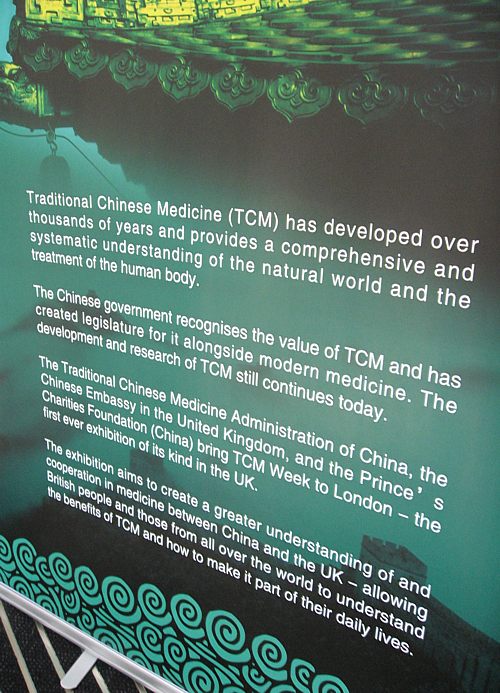
Just look at the words!
“Traditional Chinese Medicine (TCM) has developed over thousands of years”
That’s partly true
“and provides a comprehensive and systematic understanding of the natural world and the treatment of the human body.”
and that is total nonsense. TCM provides no understanding and virtually none of it is known to be useful for treating anything.
| Another poster at the RSM exhibition provides some of the explanation. What on earth, one wonders, do they mean by “making efforts to modernise TCM “? So far, the idea of modernising TCM doesn’t seem to include any great effort to find out if it works. Much of the promotion of TCM seems to be not so much ‘ancient wisdom’, but modern nationalist propaganda by the Chinese government. |
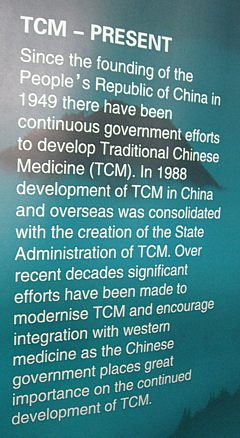 |
The history is fascinating, but you won’t learn it from the posters on display at the exhibition.
“The Daoguang emperor though it [acupuncture] was a barrier to medical progress and removed it from the curriculum of the Imperial Medical Institute,”
“By the start of the twentieth century, acupuncture was extinct in the West and dormant in the East. It might have fallen out of favour permanently, but it suddenly experienced a revival in 1949 as a direct result of the communist revolution and the establishment of the People’s Republic of China. Chairman Mao Tse-tung engineered a resurgence in traditional Chinese medicine, which included not just acupuncture but also Chinese herbal medicine and other therapies ”
“His motivation was partly ideological, inasmuch as he wanted to reinforce a sense of national pride in Chinese medicine. However he was also driven by necessity. He had promised to deliver affordable healthcare .. . . ”
“Mao did not care whether traditional Chinese medicine worked, as long as he could keep the masses contented. In fact, his personal physician, Zhisui Li, wrote a memoir entitled ‘The Private Life of Chairman Mao’, in which he quoted Mao as saying”
“Even though I believe we should promote Chinese medicine, I personally do not believe in it. I don’t take Chinese medicine.” “
Singh & Ernst Trick or Treatmant, page 46.
Or, as put more succinctly by Shapiro
“You would never know that TCM was fashioned in the twentieth century, as we shall see, from a ragbag of therapies in post-revolutionary China.”
Rose Shapiro, Suckers, how alternative medicine makes fools of us all.
Why is the Royal Society of Medicine allowing such mendacious posters? As it happens, I and a friend were visiting the RSM to see their Academic Dean, with a view to finding out why the RSM had failed to take any public position on alternative medicine. The answer appeared to be money, and that was the answer to why the TCM exhibition was being held on their premises too. The Dean no more believed in TCM than we did, but, well, they need the income. He pointed out (looking suitably sheepish) that the address given for the exhibition was not the RSM, but Number 1 Wimpole Street (that, of course, is also the address of the RSM).
Ah, so that’s OK then.
It has to be said that the RSM isn’t alone in its spineless attitude. Both the British Medical Association (BMA) and the Royal College of General Practitioners (RCGP) have failed to make any clear condemnation of mystical medicine. This is in stark contrast to just about every relevant scientific society (here is a summary).
It is a mystery to me why much of medicine should still be dominated by a mindset that seems to have lagged 200 years behind every other science. Perhaps medicine is just too complicated.
UCL Hospitals’ skeleton in the cupboard
Make no mistake, University College London Hospital is top class. The UCLH Trust. runs seven hospitals All but one of them are excellent. But in 2002 the Royal London Homeopathic Hospital was acquired as part of the UCLH group, to the intense embarrassment of UCL scientists.
Let’s start with the good bit. Usually I don’t like anecdotes, so just think of this as a vote of thanks, not evidence.
A personal history of UCH
I owe UCLH a lot personally. On December 13th 1984, my wife had
a subarachnoid haemorrhage when she was seven months pregnant. After misdiagnosis at St Peter’s Hospital, Chertsey, she was moved to UCH and diagnosed very quickly. The next day she had neurosurgery to pin an aneurysm at the Maida Vale Neurosurgical Hospital, part of the UCLH group (it no longer exists). The surgeon, Alan Crockard, came out of theatre after five hours, looking rather tired and said “it was adhered to the optic chiasma on one side and about a millilmetre from the pituitary on the other. It was a bit tricky but I think we got it”.
| After a week in intensive care, under heavy sedation, Margaret’s blood pressure was not low enough and they decided to deliver the baby. At about 4 pm on a snowy Christmas Eve, a team of neurosurgeons and a team of obstetricians gathered and soon after, Andrew Stuart Colquhoun emerged in a small incubator to be whisked off in an ambulance to the Special Care Baby Unit at UCH (run, at that time, by Osmund Reynolds).. Christmas day was spent in the hospital, with Margaret’s mother. Andrew weighed 1.4 kg at birth, but by Christmas day he had pulled out his ventilator himself, and was doing fine. He was so tiny that it was a couple of days before I dared to hold him. The Unit had racks of doll-sized clothes, knitted by volunteers. | 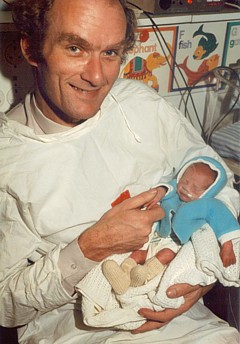
Andrew (at 9 days) and Dad. Jan 2, 1985. Click for album.. |
Once Margaret was well enough, she was given a side room in a neurosurgical ward with a cot for Andrew by her bed, an arrangement that gave the neurosurgical nurses some fun. They were in UCLH continuously until 27th April before Margaret had recovered enough to go home, [Full photo album here]
Now they are both fine.and Andrew is 6′ 7″ (200.5 cm)..
It is episodes like this that make one very proud of the NHS. Heaven knows what it would have cost in the USA.

Margaret & Andrew, with carer, Anna, June 2, 1985 |

Andrew playing cricket in Bangladesh, Feb 2005. |
But now the the less desirable side of UCLH
Herbs and homeopaths at UCLH
| Recently I was sent the UCLH Annual Review 2007 – 2008. There was a lot of good stuff in it and worth a read despite there being too much hyperbole and too many pictures of men in dark suits. But buried among all the high tech stuff, what do we find but an advertisement for 1900-style pharmacology in the form of the herbal clinic at the Royal London Homeopathic Hospital, accompanied by a load of utterly inaccurate information from the TV botanist, David Bellamy. Take, for example, the claim about Devil’s Claw for osteoarthritis. Even alternative medicine advocates said “The authors concluded that there are insufficient high-quality trials to determine the safety and efficacy of Devil’s Claw (Harpagophytum procumbens) in the treatment of osteoarthritis, and that definitive trials are needed.”
Reading between the lines, I’d guess that the opening of this clinic has a subtext. It is well known that funding for homeopathy has dried up (partly as a result of our letter to NHS Trusts that appeared in the There have been problems before with the herbal activities at the RLHH before (see Conflicts of Interest at the Homeopathic Hospital). It appeared that the Khans, who run the Marigold homeopathic podiatry clinic (no, seriously, it is real) were largely prescribing a herbal product that was made by their own company. without even the hospital trust, never mind the patients, being made aware of it. In normal medicine this would be regarded as a rather serious offence, but as far as I know, nothing was ever done about it. |
 |
The ethics of alternative medicine are truly one of life’s great mysteries.
Reading further in the annual review, we come to the page about the RLHH. The homeopathy side must really have run down because it seems to have diversified into selling cosmetics and groceries. That sounds like desperation.
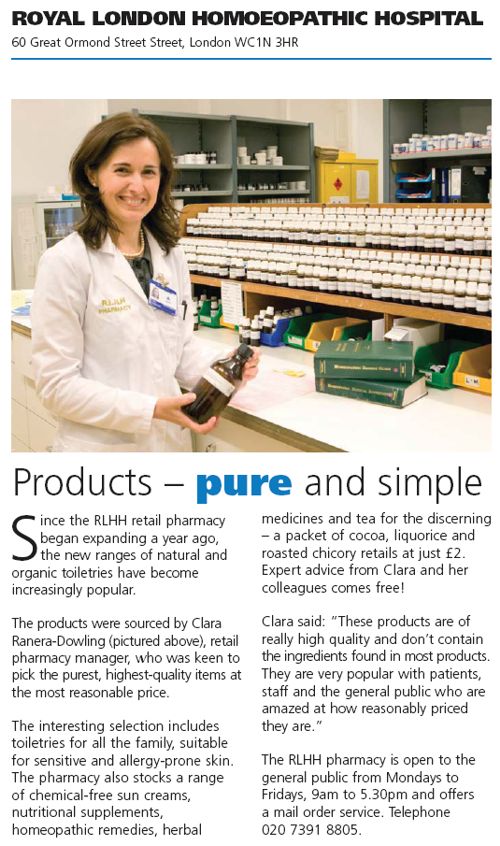
Good heavens, they sell “chemical-free sun cream”. One wonders what it can be made of, if not chemicals. This is the language of low-grade advertising agencies, not what one expects from an NHS hospital trust.
But next to this there is a much more interesting item. Just look at the last sentence.
I wonder if this could possibly have anything to do with the fact that Michael Baum and I visited the Trust headquarters in August 2006 to propose that the RLHH might be turned into a centre of supportive and palliative care? It would be nice to think so. But it seems they haven’t gone nearly far enough yet. If all they do is replace the waning homeopathy We know they are under pressure from their royal patrons, but that, in a constitutional monarchy, is simply not acceptable. |
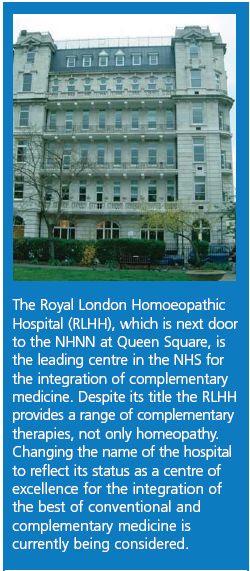 |
Michael Baum is a cancer surgeon who has taken a particular interest in palliative and supportive care. He is someone whose views should be taken seriously. He is also the author of the magnificent “An open letter to the Prince of Wales: with respect, your highness, you’ve got it wrong” Here is a quotation from that letter. The UCLH Trust should bear it in mind.
| The power of my authority comes with a knowledge built on 40 years of study and 25 years of active involvement in cancer research. I’m sensitive to the danger of abusing this power and, as a last resort, I know that the General Medical Council (GMC) is watching over my shoulder to ensure I respect a code of conduct with a duty of care that respects patients’ dignity and privacy and reminds me that my personal beliefs should not prejudice my advice. Your power and authority rest on an accident of birth. Furthermore, your public utterances are worthy of four pages, whereas, if lucky, I might warrant one. I don’t begrudge you that authority and we probably share many opinions about art and architecture, but I do beg you to exercise your power with extreme caution when advising patients with life threatening diseases to embrace unproven therapies. There is no equivalent of the GMC for the monarchy, so it is left either to sensational journalism or, more rarely, to the quiet voice of loyal subjects such as myself to warn you that you may have overstepped the mark. It is in the nature of your world to be surrounded by sycophants (including members of the medical establishment hungry for their mention in the Queen’s birthday honours list) who constantly reinforce what they assume are your prejudices. Sir, they patronise you! Allow me this chastisement. |
Follow-up
The photo album chronicling the birth of my son, is really just for family and friends, but at least one blog picked up on the wider significance.

It may be only post-1992 universities that run degrees in nonsense, but you can find plenty even in the highest places. Like St Bartholomew’s (founded in 1123). That well known source of misleading medical advice, The Prince’s Foundation for Integrated Health (FiH), published last March, “Teaching integrated health at Barts and the London“. This consists of an interview with two members of staff from what is now known as the Barts and The London School of Medicine and Dentistry (SMD)..
| Dr Mark Carroll BSc (Hons), PhD, FHEA is Associate Dean (Education Quality) in the Centre for Medical Education (SMD), specialising in all aspects of quality assurance in the SMD |  |
| Prof Chris Fowler BSc MA MS FRCP FRCS(Urol) FEBU is Dean of Education |  |
They say they are dubious about alternative medicine, but rather keen on integrated medicine. Seems odd, since the latter is really just a euphemism for the former.
After seeing the FiH posting, I wrote to Carroll and Fowler to get more information.
From Carroll 20 March
We are at an early stage in the planning process for the “Integrated Health & Wellbeing” strand in our new MBBS curriculum. I can send you our ideas (attached). Much will depend on whether we can make a new appointment of someone who can lead on the planning
From Fowler 25 March 2008
Our discussions with the PFIH [Prince’s Foundation for Integrated Health] have only progressed to the stage of indicating an indicative curriculum for integrated health. We don’t have the sort of detail that you are asking for at present. We are hoping that they will work with us to get someone to champion the development.
. . .
Your views would be welcome
So I sent them some views on 26 March (read them here). I also said “I find it quite astonishing that a respectable medical school should feel it appropriate to have parts of its curriculum in the hands of the Prince of Wales.”. It seems, though, that only one sort of view was wanted. On 27 March. Fowler wrote
“I find your insinuation unnecessary and insulting. We have been working on a serious response to the GMC’s requirement that we teach medical students about the range of options available to patients. It is fatuous to suggest that the Prince of Wales is personally involved in any practical sense. The Prince’s Foundation for Integrated Health is an important stakeholder and I think that it entirely reasonable both to talk to them and to seek funding to help us to develop an area that is deficient in our current provision.”
Uhuh, not a very nice response to a rather moderate letter. Lesson 1: never trust anyone who uses the word “stakeholder”.
It does seem very odd that a medical school like Barts should turn to the Prince of Wales’ Foundation for advice on medicine. After all, the bad advice given by the “Patients Guide” is rather well documented (see also here). If messrs Fowler and Carroll were really unaware of that, I’d argue that they aren’t doing their job properly.
It seems that Barts, like Edinburgh, has over-reacted to pressure from the General Medical Council (GMC). Actually all that the GMC require is that
“They must be aware that many patients are interested in and choose to use a range of alternative and complementary therapies. Graduates must be aware of the existence and range of such therapies, why some patients use them, and how these might affect other types of treatment that patients are receiving.” (from Tomorrow’s Doctors, GMC)
There is nothing there about saying that they work. Certainly medical students need to be familiar with alternative medicine, given the number of theit patients that use it. That is a job I have done myself, both at UCL and at Kings College London. I’d argue that I am marginally better qualified to assess the evidence than the Prince of Wales.
Oddly enough, the bad education in Edinburgh came also from a Professor of Medical Education and Director of Undergraduate Learning and Teaching,
The result is manifested in two ways. Barts has a “Science in Medicine” course that has resulted in medical students being placed with homeopaths. And it has a Special Studies Module in Ayurvedic Medicine. Let’s take a look at them.
An Introduction to Ayurvedic Medicine
| The aims of this Special Study Module are “To introduce the concepts and principles which underpin Ayurvedic medicine. To introduce Year 1 and 2 medical students to the Ayurvedic approach to patient assessment, diagnosis and treatment”, and to “Critically evaluate the evidence base for Ayurvedic treatments and yoga therapy”. Just one small snag there. There is next to no evidence base to be assessed. | Click to enlarge |
The module is given by Professor Shrikala Warrier, who is Dean of MAYUR: The Ayurvedic University of Europe. That sounds quite grand. But the web site of The Ayurvedic University of Europe is rather unusual for a university. It lists two courses but has no list of staff. Could it be that Professor Shrikala Warrier is the staff? Neither is it clear where Professor Warrier’s professorial title comes from. Her own private university perhaps?
The two courses it offers are B.Sc.(Hons) Ayurveda and B.Sc.(Hons) Yoga. It says that the course the “BA(Hons)Ayurvedic Studies is a three year programme of study developed in collaboration with Thames Valley University in London”. That’s odd too, because there is no mention of it on the Thames Valley University web site (and TVU is not in London, it’s in Slough). Elsewhere it is stated that the “programme has been validated by MAHE, which is also the degree awarding body”. MAHE is not explained but it appears to refer to the Manipal Academy of Higher Education, in Goa, India. That looks like a pretty good place. It does not offer degrees in Ayurveda, though there is a small Department of Ayurvedic medicine within the otherwise entirely conventional Kasturba Medical College-Manipal. Their first year physiology exam would tax our students.
Elsewhere we see the same address, 81 Wimpole Street, listed as The Manipal Ayurvedic University of Europe (a joint venture between The Manipal University and the Ayurvedic Company of Great Britain) Prof. S. Warrier, B.A.(Hons), M.A., Ph.D., MILT, Dean of Academic Planning.
If one checks Mayur Ltd at Companies House, one finds that it has two directors, Lady Sarah Morritt and Professor Shrikala Warrier. The company report shows that no accounts have been filed up to now and their 2008 accounts are overdue.
The business history of ayurveda is nothing if not tortuous. The London Gazette (May 2008) notifies us that
AYURVEDA HOLDINGS LIMITED (chairman Lady Sarah Morritt) was passed a Special Resolution: “That the company be wound up voluntarily.”
If you email the Ayurvedic University of Europe, the reply comes not from a University address but from unififiedherbal.com. That seems to be some sort of marketing company, at the same address, 81 Wimpole Street. But efforts to find out more about it from Companies House show that UnifiedHerbal.com was dissolved on 3 October 2006.
Several of the links are broken on the web site of Ayurvedic University of Europe, but one that does work is ‘products’. That takes you to the sales pages of http://www.drwarrier.co.uk/. That doesn’t look much like a university, but no prizes for guessing the address. Yes, it’s 81 Wimpole Street again. They will sell you all sorts of cosmetics, though Companies House lists Dr Warrier Limited, and tells us
Last Accounts Made Up To : 31/08/2007 (DORMANT) and
Next Return Due : 26/09/2008 OVERDUE. Their registered office is
at Harold House, Waltham Cross EN8 7AF.
From drwarrier.co.uk you can buy, for example,
The most commonly prescribed Ayurvedic formula. Triphala is an effective blood purifier that detoxifies the liver, helps digestion and assimilation, and reduces serum cholesterol and lipid levels.
Blood purifier? Detox? Where have we seen this sort of utter gobbledygook before? Or perhaps she can sell you some
Traditionally used for obesity and overweight, and reducing and preventing accumulation of cholesterol (LDL). Its anti-inflammatory and detoxifying actions help reduce arthritic pain and swelling.
There isn’t the slightest evidence for these effects in man. Hence, no doubt, the usual weasel words. “traditionally used for . . . ”
The sales department alone casts rather a large doubt on Prof Warrier’s ability to teach medical students how to “critically evaluate the evidence base for Ayurvedic treatments”.
It does seem a bit surprising that a top flight medical school should think that this is an appropriate place to educate its students.
Medicine in Society
The syllabus at Barts includes something called Medicine and Society. Page 5 of the second year Tutor Guide mentions “complementary therapies” as part of the course. There is little hint about what that means in practice.
It turns out that the alt med placements are at the Greenwich Natural Health Centre. Nothing is too barmy for them Acupuncture. Cranial Osteopathy, Craniosacral Therapy, Herbal Therapy, Homeopathy, Hot Stone Therapy and Nutritional therapy to name but a few of the preposterous make-believe stuff that is on offer.
Medical students are having to spend their time listing to stuff like this, on ‘hot stone therapy’.
“Hot stone therapy / massage is a kind of massage that uses treated volcanic rocks such as basalt and basinite that are believed to promote relaxation as well as eliminating negative energy within the client’s body, mind and soul.”
“These stones are carefully gathered and handcrafted for various sizes, shapes and weights according to what part of the body it will be use on.”
Or this, on ‘nutritional therapy’.
“Many of us lack the basic raw materials (from food and drink) to function at our best. Intensive farming, pollution, stress, stimulants and an over-reliance on processed foods are just some of the reasons for us being deficient in vital nutrients. As a result, we may develop serious degenerative diseases like cancer or arthritis.”
“Some clients may experience reactions like headaches, skin eruptions or bad breath during the first stage of treatment. These are quite normal and are due to detoxification, which is usually followed by a sense of well-being and increased energy.”
That must be about as close as you can get to claiming you can prevent cancer by taking vitamin pills. It is wrong and it is dangerous,
Sigh. What century are we living in?
According to Barts’ second year Tutor Guide, “Placement tutors are responsible for student assessment”.
What sort of grade will the student get if they tell their tutor in homeopathy or ‘Nutritional therapy’ that they are talking nonsense?
What do the students think?
Could the Ayurvedic course be the very same course that is referred to by a second year medical student on the Unprotected Text blog?
“When I found out my friend had been attached to a “doctor” in Ayurvedic “medicine” for the year I was horrified, as was she, and the school would not allow her to change claiming that the point is not to learn the medicine but its role in the multidisciplinary healthcare team.
I don’t believe that there is such a role.
The very fact that a student is forced to put up with this as a part of their education is appalling.”
A comment left on Unprotected Text by someone writing as ‘Barts Medic’ said
“I was HORRIFIED to hear that some of my friends have their medsoc placements
at such RUBBISH places too!last week, they were forced into a room one by room to be touched up (‘massaged’)
by the ‘doctor-person’ to HEAL them. she rubbed them all over, and CHANTED! WTF.if i was given a CRAPPY placement like that, i wouldnt turn up either”.
And there is an excellent statement about “holistic medicine” on Unprotected Text. Better, perhaps, than you’d get from the GMC.
“Holistic medicine is in fact a world away from homeopathy, although the two are often confused predominantly by homeopaths trying to validate their branch of “medicine”. Much of what is taught in medical school is in fact, holistic, and so it should be. The importance of mentality, or spirituality in medicine should not be used to excuse homeopathy.”
“That doesn’t seem to add up” is another blog that relates the experiences of another student who has been exposed to “Enforced quackery Day 1, “, “Enforced quackery Day 2“, “Enforced quackery Days 3 and 4“. He says
“. . .by the end of day 3 the students *still* hadn’t seen any patients and that, when confronted with this fact the person in charge is reported to have said that this was because she was scared of what the students might say to the patients… Apart from this being a massive insult to the professionalism of the students, it is at least an encouraging sign that they have not been very effectively indoctrinated.”
It seems that we shall soon have some more documentary evidence. It is truly impressive to find that Barts’ medical students are so bright and that they have the courage to speak up about it.
So there is one good thing. We have some very perspicacious medical students in London.
Pity that one can’t say the same thing of their teachers.
Follow-up
I have it on good authority that the unhappy students who were placed at the Greenwich Natural Health Centre were presented with one of the more absurd documents ever to be produced by homeopaths, “An Overview of positive homeopathy research and surveys“.
There is no need to argue about whether homeopaths cherry-pick the evidence. The selective use of evidence is announced proudly, right there in the title.
What excuse can Bart’s have for exposing medical students to such profoundly anti-educational stuff as this?
Later there appeared on the That doesn’t seem to add up blog, Enforced
Quackery – the literature. The unfortunate students who were pushed into a homeopathic placement were give a print out of a page from Sue Young’s homeopathic web site. It is merely a bit of phony history that attempts to link Pasteur with homeopathy.
Sue Young, incidentally, is a homeopath who has consistently breached the Code of Ethicsof the Society of Homeopaths by claiming to treat serious diseases, though needless to say the Society did nothing about it. She is also the person who wrote a wholly inaccurate account of the reasons why my blog left the UCL server (see alse here and here). She didn’t, needless to say, ask me, but luckily she was soon corrected on quackometer and in the Guardian.
Incidentally, the Unprotected Text blog continues to provide a fascinating student view on medical education. Students show more sense than their teachers not only about alternative nonsense but also about other gimmicks like ‘problem based learning’.
Shortly after I published my editorial in the New Zealand Medical Journal, Dr Who?, I was delighted to get a letter from someone who had trained in chiropractic and seen it all from the inside.
Sadly this wonderful letter had to be removed within a few weeks of posting it because its author was threatened and bullied by chiropractors. Its author is too young and too vulnerable to risk his future career. As a result of this shameful and vindictive treatment, I was asked to remove the letter and did so immediately. Other copies on the web have now vanished too.
The experiences described in the letter justified much of what I said in the editorial, and in some ways went further. This letter doubtless contributed to dropping of the threatened legal action by chiropractors against the Journal and against me. The letter was posted originally on 21 August 2008, with the permission of its author. See also the follow-up in Chiropractic wars. Part 3: internecine conflict.
Now I have been sent a much more anonymous version, and it is a great pleasure to post this inside information.
| David
I must begin by stating my background in relation to chiropractic. I am a graduate of a chiropractic college and have practiced for several years. I have elected not to register or practice again and have returned to study to begin a new career. Prior to studying chiropractic, I gained undergraduate and postgraduate qualifications in science. First I would like to address your comment about the validity of a qualification from a private chiropractic college, especially in relation to the difference between studying there and studying at a university. A major difference is the education and experience of faculty. At the time I was there, most of the faculty at my college had only undergraduate qualifications (I would suggest that the American DC degree is of undergraduate level as it is the primary qualifying degree for chiropractic in the US and Canada -it is not the equivalent of a doctorate in a British or Australasian university) and have not published in peer-reviewed journals. This is quite different to my experience of universities where the all of the faculty usually have at least a PhD and are actively involved in research. The content of the chiropractic curriculum was voluminous. It included basic sciences, chiropractic subjects and social sciences. The college I attended did not have any laboratory facilities so the experience of learning science from a textbook was quite different to the way I had been taught at university, where each subject had a significant laboratory program that had to be passed separately to pass the subject. As chiropractic is a clinical discipline, the course contained subjects in common with a medical degree. Sadly, the attitude towards medicine and the medical profession was not always the most constructive. For example, I can recall a noticeboard where newspaper clippings of media reports of medical misadventure and adverse effects of pharmaceuticals were posted regularly. Clinical experience was gained by a 2 year internship in the school health centre concurrent with the last 2 years of academic study; so it was not a full-time internship. The requirements for passing this component of the course were complex but centred around seeing a number of patients, a number of visits, performing a number of various kinds of x-rays and reading a number of x-ray films. Every student was responsible for finding all of their own patients to meet the requirements. The result of this was a clinical experience that was quite narrow for most people. This would seem to be quite different to the hospital internship of a medical degree, the clinical internship of a dental degree or the range of placements in a physiotherapy degree in terms of the breadth of experience of different kinds of patients of different ages and states of health. For people who are not aware, there are a range of ideas within chiropractic about what it is and what it is for. The “wellness”, subluxation-based kind of chiropractic is taught by a minority of schools and is what chiropractors call a “philosophical view”. It advocates that chiropractic care be independent from symptoms or treatment and be a regular part of peoples’ lives. The expectation is that healthy, asymptomatic people will be “adjusted” on a regular basis to keep them free from “vertebral subluxation”. To that end, the training at schools that teach this approach is adequate (and probably even excessive). The issue that you wrote about related to the use of the title “doctor” by chiropractors in New Zealand. In licensing chiropractors and allowing them the use of the title “Dr” in front of their names (provided that the title is qualified by the word “chiropractor”) governments have awarded chiropractors with recognition and prestige that has usually been associated with a level of academic achievement or with a medical qualification. It indicates that the bearer of the title can be trusted to give credible advice within their area of expertise. The issue may seem benign, but in allowing chiropractors to use the title, people who would not normally feel safe to submit to the treatment of an alternative health practitioner, choose to try chiropractic. I make this point because at its core, chiropractic is quite different to medicine, dentistry and physiotherapy. A chiropractic office often looks like a lot like a doctor’s surgery. The layout is similar (with waiting rooms and consultation rooms; there are things like stethoscopes and x-ray machines and there are often informative and education posters and brochures. In many cases, the title “doctor” is used in I have found that some people believe chiropractors are medical doctors. Some even believe that chiropractic is a kind of medical speciality. I have seen patients who choose chiropractic as their primary health care and come to a chiropractic office as their first port of call when they are unwell. I Two practices are of particular concern in some chiropractic offices and in my view; these alone should be sufficient reason to prevent chiropractors from calling themselves “doctor”. The first is the systematic and deliberate erosion of a person’s confidence in the medical system. Many offices have anti medical literature in their libraries. Chiropractors are sometimes taught practices to subvert medical credibility. See http://chirobase.org/20PB/top7.html for an example. The second is a subset of the first but is particularly damaging. It is active opposition to vaccination. At chiropractic school, I was taught anti-vaccination information in my paediatrics course. I have seen books written by chiropractors opposing vaccination and I have seen many offices with anti vaccination leaflets and books in abundance. Now I am all for informed choice but this type of material is rarely accurate or balanced. People are being encouraged not to vaccinate their children by professionals who they believe to be a reliable and prestigious source of information. Although it may sound paternalistic to people who have not had the privilege of clinical practice (albeit in a profession I no longer agree with), it made me realise several things. The first is that people who are unwell are vulnerable. The second is that there are people who trust “medical” advice unquestioningly. I believe we should be very careful about who we title as a credible source of advice about health care. Legislation treads a fine line between limiting personal freedom and protecting people from harm. Aside from the qualification being inconsistent with the academic level that is usually required to use the title “Doctor”, the greatest danger, in my opinion, is that the legal recognition and permission to use the title has allowed chiropractors to assume the mantle of a doctor. In the guise of this respectability, some chiropractors are deliberately eroding confidence in doctors and denying children (and possibly populations) the protection of vaccination. David, thank you for having the courage to question the use of the title “doctor” by chiropractors. Historically (and in your case), chiropractors fight their battles through litigation so it takes personal courage and integrity to do so. |
All I can say is, don’t thank me. It doesn’t take much courage at my age. It takes a lot at yours and the world should be grateful to you.
Replies from chiropractors in the NZMJ
The New Zealand Medical Journal, very properly, allowed right of reply to chiropractore. This week’s issue contains three letters, one of which is from Paul Kelly. It is signed “Dr Brian Kelly B App Sci (Chiro), President, New Zealand College of Chiropractic”. This is not quite the same as appears on his College’s web site which shows the president’s welcome.

It seems that Kelly has not been quite so careful about use of his title on the web site because (as of 21 August) the signature on his address looks like this.

“Dr Brian Kelly, President”. That does seem a bit careless, given that his usage of “Dr” was pointed out in my original editorial, published on 25th July.
Replies to these letters appeared in the September 5th issue of NZMJ.
It’s hard enough to communicate basic ideas about how to assess evidence to adults without having the effort hindered by schools.
The teaching of quackery to 16 year-olds has been approved by a maze of quangos, none of which will take responsibility, or justify their actions. So far I’ve located no fewer than eight of them.
[For non-UK readers, quango = Quasi-Autonomous Non-Governmental Organisation].





![]()


A lot of odd qualifications are accredited by OfQual (see here). Consider, for example, Edexcel Level 3 BTEC Nationals in Health and Social Care (these exams are described here), Download the specifications here and check page 309.
Unit 23: Complementary Therapies for Health and Social Care
NQF Level 3: BTEC National
Guided learning hours: 60Unit abstract
“In order to be able to take a holistic view towards medicine and health care, health and social care professionals need to understand the potential range of complementary therapies available and how they may be used in the support of conventional medicine.”
Well, Goldacre has always said that homeopathy makes the perfect vehicle for teaching how easy it is to be deceived by bad science, so what’s wrong? But wait
“Learners will consider the benefits of complementary therapies to health and wellbeing, as well as identifying any contraindications and health and safety issues in relation to their use.”
Then later
“The holistic approach to illnesses such as cancer could be used as a focus here. For example, there could be some tutor input to introduce ideas about the role of complementary therapies in the treatment and management of cancer, this being followed up by individual or small group research by learners using both the internet and the services available locally/regionally. If available, a local homeopathic hospital, for example, would be an interesting place to visit.”
It’s true that to get a distinction, you have to “evaluate the evidence relating to the use of complementary therapies in contemporary society”, but it isn’t at all clear that this refers to evidence about whether the treatment works.
The really revealing bit comes when you get to the
“Indicative reading for learners
There are many resources available to support this unit.Websites
www.acupuncture.org.uk British Acupuncture Council
www.bant.org.uk British Association for Nutritional Therapy
www.exeter.ac.uk/sshs/compmed Exeter University’s academic department of Complementary medicine
www.gcc-uk.org General Chiropractic Council
www.nimh.org.uk National Institute of Medical Herbalists
www.nursingtimes.net The Nursing Times
www.osteopathy.org.uk General Osteopathic Council
www.the-cma.org.uk The Complementary Medical Association”
This list is truly astonishing. Almost every one of them can be relied on to produce self-serving inaccurate information about the form of “therapy” it exists to promote. The one obvious exception is the reference to Exeter University’s academic department of complementary medicine (and the link to that one is wrong). The Nursing Times should be an exception too, but their articles about CAM are just about always written by people who are committed to it.
It is no consolation that the 2005 version was even worse. In its classification of ‘therapies’ it said “Pharmaceutically mediated: eg herbalism, homeopathy “. Grotesque! And this is the examinng body!
The Teacher
This particular educational disaster came to my attention when I had a letter from a teacher. She had been asked to teach this unit, and wanted to know if I could provide any resources for it. She said that Edexcel hadn’t done so. She asked ” Do you know of any universities that teach CT’s [sic] so I could contact them about useful teaching resources?.” She seemed to think that reliable information about homeopathy could be found from a ‘university’ homeopathy teacher. Not a good sign. It soon emerged why.
She said.
“My students are studying BTEC National Health Studies and the link is Edexcel BTEC National Complimentary [sic] studies.”
“I am a psychotherapist with an MA in Education and Psychology. I am also trained in massage and shiatsu and have plenty of personal experience of alternative therapy”
Shiatsu uh? It seems the teacher is already committed to placebo medicine. Nevertheless I spent some time looking for some better teaching material for 16 year-old children. There is good stuff at Planet
Science, and in some of the pamphlets from Sense about Science, not least their latest, I’ve got nothing to lose by trying it – A guide to weighing up claims about cures and treatments. I sent all this stuff to her, and prefaced the material by saying
“First of all, I should put my cards on the table and say that I am quite appalled by the specification of Unit 23. In particular, it has almost no emphasis at all on the one thing that you want to know about any therapy, namely does it work? The reference list for reading consists almost entirely of organisations that are trying to sell you various sorts of quackery, There is no hint of balance; furthermore it is all quite incompatible with unit 22, which IS concerned with evidence.”
At this point the teacher the teacher came clean too, As always, anyone who disagrees with the assessment (if any) of the evidence by a true believer is unmeasured and inflammatory.
“I have found your responses very unmeasured and inflammatory and I am sorry to say that this prejudicial attitude has meant that I have not found your comments useful.”
shortly followed by
“I am not coming from a scientific background, neither is the course claiming to be scientific.”
That will teach me to spend a couple of hours trying to help a teacher.
What does Edexcel say?
I wrote to Edexcel’s science subject advisors with some questions about what was being taught. The response that I got was not from the science subject advisors but from the Head of Customer support, presumably a PR person.
| From: (Bola Arabome) 12/11/2008 04.31 PM
Dear Professor Colquhoun Thank you for email communication concerning the complementary therapies unit which is available in our BTEC National in Health and BTEC National in Health and Social Care qualifications. I have replied on behalf of Stephen Nugus, our science subject advisor, because your questions do not refer to a science qualification. I would like to answer your questions as directly as possible and then provide some background information relating to the qualifications. The units and whole qualifications for all awarding bodies are accredited by the regulator, the Qualifications and Curriculum Authority. The resource reading list is also produced by us to help teachers and learners. The qualification as a whole is related to the National Occupational Standards for the vocational sectors of Health and Health and social care with consultation taken from the relevant sector skills councils . As you will be aware many of these complementary therapies are available in care centres and health centres under the NHS and in the private sector. The aim of BTEC qualifications is to prepare people for work in these particular sectors. Clearly a critical awareness is encouraged with reference to health and safety and regulation. There are other units, in some cases compulsory, within the qualification with a scientific approach. ‘ ‘ ‘ ‘ ‘ Stephen Harris Head of Customer Support |
Aha, so it seems that teaching people to treat sick patients is “not a science qualification”. Just a business qualification perhaps?. I haven’t yet managed to reach the people who make these decisions, so I persisted with the PR man. Here is part of the next letter (Edexcel’s reply in italic).
| 19 November
I find it quite fascinating that Edexcel regards the treatment of sick patients as not being part of science (“do not refer to a science qualification”). Does that mean Edexcel regard the “Health” part of “Health and Social Care” as being nothing to do with science, and that it therefore doesn’t matter if Health Care is unscientific, or even actively anti-scientific? I am sorry if my answer lacked clarity. My comment, that I had taken your enquiry on behalf of our Science Advisor because this was not a science qualification, was intended to explain why I was replying. It was not intended as a comment on the relationship between Health and Social Care and science. At Edexcel we use bureaucratic categories where we align our management of qualifications with officially recognised occupational sectors. Often we rely on sector bodies such as Sector Skills Councils to endorse or even approve the qualifications we offer. Those involved in production of our Science qualifications and our (4) You say “The qualification as a whole is related to the National Occupational Standards for the vocational sectors of Health and Health and social care with consultation taken from the relevant sector skills councils”. Are you aware that the Skills for Health specifications for Alternative medicine were written essentially by the Prince of Wales Foundation? The qualification was approved by both ‘Skills for Health’ and ‘Skills for Care and Development’ prior to being accredited by QCA. It uses the NOS in Health and Social Care as the basis for many of the mandatory units. The ‘Complementary Therapies’ NOS were not used. This was not a requirement of a ‘Health and Social Care’ qualification. “Are the NOS in Health and Social Care that you mention the ones listed here? http://www.ukstandards.org/Find_Occupational_Standards.aspx?NosFindID=1&ClassificationItemId=174 If so, I can see nothing there about ‘complementary therapies’. if I have missed it, I’d be very grateful if you could let me know where it is. If it is not there, I remain very puzzled about the provenance of Unit 23, since you say it is not based on Skills for Health.” |
Now we are immediately at sea, struggling under a tidal wave of acronyms for endless overlapping quangos. In this one short paragraph we have no fewer than four of them. ‘Skills for Health’, ‘Skills for Care and Development’ , ‘Quality and Curriculum Authority (QCA) and NOS.
It seems that the specification of unit 23 was written by Edexcel, but Harris (25 Nov) declines to name those responsible
“When I refer to our “Health and Social care team” I mean the mix of Edexcel Staff and the associates we employ on a contract basis as writers, examiners and external verifiers. The writers are generally recruited from those who are involved in teaching and assessment the subjects in schools and colleges. The editorial responsibility lies with the Edexcel Staff. I do not have access to the names of the writers and in any case would not be able to pass on this information. Specifications indicate the managers responsible for authorising publication”
“Edexcel takes full responsibility for its ethical position on this and other issues. However we can not accept responsibility for the opinions expressed in third party materials. There is a disclaimer to this effect at the beginning of the specification. ”
” You have the correct link to the Health NOS . These are the standards, which where appropriate, influence our qualifications. However in the case of Unit 23 I understand that there is no link with the Health NOS. I don’t know if the NOS cover the unit 23 content.”
So, contrary to what I was told at first, neither Skills for Health, nor NOS were involved Or were they (see below)?
So who does take responsibility? Aha that is secret. And the approval by the QCA is also secret.
“I cannot provide you with copies of any correspondence between Skills for Health and Edexcel. We regard this as confidential. “
What does the QCA say?
The strapline of the QCA is
“We are committed to building a world-class education and training framework. We develop and modernise the curriculum, assessments, examinations and qualifications.”
Referring school children to the Society of Homeopaths for advice seems to be world-class bollocks rather than world-class education.
When this matter was brought to light by Graeme Paton in the Daily Telegraph, he quoted Kathleen Tattersall, CEO of the QCA. She said
“The design of these diplomas has met Ofqual’s high standards. We will monitor them closely as they are delivered to make sure that learners get a fair deal and that standards are set appropriately.”
Just the usual vacuous bureaucratic defensive sound-bite there. So I wrote to Kathleen Tattersall myself with some specific questions. The letter went on 2nd September 2008. Up to today, 26 November, I had only letters saying
“Thank you for your email of 12 November addressed to Kathleen Tattersall, a response is being prepared which will be forwarded to you shortly.”
“Thank you for your email of 25th November addressed to Kathleen Tattersall. A more detailed response is being prepared which will be sent to you shortly.”
Here are some of the questions that I asked.
| I wrote to Edexcel’s subject advisors about unit 23 and I was told “your questions do not refer to a science qualification”. This seems to mean that if it comes under the name “Health Care” then the care of sick patients is treated as though it were nothing to do with science, That seems to me to be both wrong and dangerous, and I should like to hear your view about that question.
Clearly the fundamental problem here is that the BTEC is intended as a vocational training for careers in alternative medicine, As a body concerned with education, surely you cannot ignore the view of 99% of scientists and doctors that almost all alternative medicine is fraud. That doesn’t mean that you can’t make a living from it, but it surely does create a dilemma for an educational organisation. What is your view of that dilemma? |
Eventually, on 27th November, I get a reply (of sorts) It came not from the Kathleen Tattersall of the QCA but from yet another regulatory body, OfQual, the office of the Qualifications and Examinations Regulator. You’d think that they’d know the answers, but if they do they aren’t telling, [download whole letter. It is very short. The “more detailed response” says nothing.

Ofqual does not take a view on the detailed content of vocational qualifications as that responsibility sits with the relevant Sector Skills Council which represents employers and others involved in the sector. Ofqual accredits the specifications, submitted by sector-skilled professionals, after ensuring they meet National Occupational Standards. Ofqual relies on the professional judgement of these sector-skilled professionals to include relevant subjects and develop and enhance the occupational standards in their profession. The accreditation of this BTEC qualification was supported by both Skills for Health, and Skills for Care and Development, organisations which represent the emerging Sector Qualifications Strategies and comply with the relevant National Occupational Standards Isabel Nisbet Acting Chief Executive |
So no further forward. Every time I ask a question, the buck gets passed to another quango (or two, or three). This letter, in any case, seems to contradict what Edexcel said about the involvement of Skills for Health (that’s the talking to trees outfit),
A nightmare maze of quangos
You may well be wondering what the relationship is between Ofqual and the QCA. There is an ‘explanation’ here.
Ofqual will take over the regulatory responsibilities of the Qualifications and Curriculum Authority (QCA), with stronger powers in relation to safeguarding the standards of qualifications and assessment and an explicit remit as a market regulator. The QCA will evolve into the Qualifications and Curriculum Development Agency (QCDA): supporting Ministers with advice and undertaking certain design and delivery support functions in relation to the curriculum, qualifications, learning and development in the Early Years Foundation Stage, and National Curriculum and Early Years Foundation Stage assessments.
Notice tha QCA won’t be abolished. There will be yet another quango.
The result of all this regulatory bureaucracy seems to be worse regulation, Exactly the same thing happens with accreditiation of dodgy degrees in universities.
At one time, a proposal for something like Unit 23 would have been shown to any competent science teacher, who would have said”you must be joking” and binned it. Now a few hundred bureaucrats tick their boxes and rubbish gets approved.
There seems to be nobody in any of these quangos with the education to realise that if you want to know the truth about homeopathy, the last person you ask is the Society of Homeopaths or the Prince of Wales.
What next?
So the mystery remains. I can’t find out who is responsible for the provenance of the appallingly anti-science Unit 23, and I can’t find out how it got approved. Neither can I get a straight answer to the obvious question about whether it is OK to encourage vocational qualifications for jobs that are bordering on being fraudulent.
.All I can get is platitudes and bland assurances. Everything that might be informative is clouded in secrecy.
The Freedom of Information requests are in. Watch this space. But don’t hold your breath.
Follow-up
Here are some attempts to break through the wall of silence.
Edexcel. I sent them this request.
Freedom of Information Act
Hello
I should like to see please all documents from Edexcel and OfQual or QCA (and communications between then) that concern the formulation and approval of Unit 23 (Complementary Therapies) in the level3 BTEC (page 309 in attached document). In vew of the contentious nature of the subject matter, I believe that is is in the public interest that this information be provided
David Colquhoun
The answer was quite fast, and quite unequivocal, Buzz off.
| Dear Mr Colquhoun,
Thank you of your e-mail of today’s date. I note your request for information pursuant to The Freedom of Information Act. As you may know this Act only applies to public bodies and not to the private sector. Edexcel Limited is privately owned and therefore not subject to this Act. Edexcel is therefore not obliged to provide information to you and is not prepared to give you the information you seek. Please do not hesitate to contact me again if you have any further queries. Kate Gregory |
This lack of public accountability just compounds their appalling inability to distinguish education from miseducation.
International Therapy Examination Council (ITEC)
Mojo’s comment, below, draws attention to the Foundation degree in Complementary Therapies offered by Cornwall College, Camborne, Cornwall (as well as to the fact that the Royal National Lifeboat Institution has been wasting money on ‘research’ on homeopathy –write to them).
At least the courses are held on the Camborne campus of Cornwall College, not on the Duchy campus (do we detect the hand of the Quacktitioner Royal in all this nonsense?).
Cornwall College descends to a new level of barminess in its course Crystal Healing VTCT Level 3
“Who is this course for?
This course is designed to enhance the skills of the Holistic Therapist. Crystals may be used on their own in conjunction with other therapies such as Indian Head Massage, Aromatherapy and Reflexology. Due to the nature of the demands of the holistic programme this course is only suitable for students over the age of 18.”
“What will I be doing on the course?
Students will study the art of Crystal healing which is an energy based treatment where crystals and gemstones are used to channel and focus various energy frequencies.”
| .VTCT stands for the Vocational Training Charitable Trust.
It is yet another organisation that runs vocational exams, and it is responsible for this particular horror |
 |
The crystals are here. I quote.
Objectives
- the use of interpersonal skills with client
- how to complement other therapies with crystals
- the types and effects of different crystals
- uses of crystals including cleansing, energising, configurations
- concepts of auras and chakras
This is, of course, pure meaningless nonsense. Utter bollocks being offered as further education
Cornwall College has many courses run by ITEC.
The College says
“You will become a professional practitioner with the International Therapy Examination Council (ITEC), study a number of essential modules to give a vocational direction to your study that include: Homeopathy and its application,”
| Who on earth, I hear you cry, are ITEC? That brings us to the seventh organisation in the maze of quangos and private companies involved in the miseducation of young people about science and medicine. It appears, like Edexcel, to be a private company though its web site is very coy about that. | 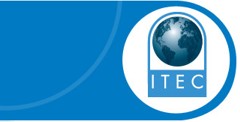 |
After the foundation degree you can go on to “a brand new innovative BSc in Complementary Health Studies (from Sept 2009)”
The ITEC web site says
- ITEC qualifications are accredited by the Office of the Qualifications and Examination Regulator (OFQUAL)
- ITEC qualifications are funded in the uk by the on behalf of Department for Innovation, Universities and Skills (DIUS)
- ITEC qualifications have been mapped to the National Occupational Standards, where they exist
Oddly enough, there is no mention of accreditation by a University (not that that is worth much). So a few more Freedom of Information requests are going off, in an attempt to find out why are kids are being miseducated about science and medicine.
Meanwhile you can judge the effect of all that education in physiology by one of the sample questions for ITEC Unit 4, reflexology.
The pancreas reflex:
A Extends across both feet
B Is on the right foot only
C Is on the left foot only
D Is between the toes on both feet
Uhuh, they seem to have forgotten the option ‘none of the above’.
Or how about a sample question from ITEC Unit 47 – Stone Therapy Massage
Which organ of the body is associated with the element fire?
A Heart
B Liver
C Spleen
D Pancreas
Or perhaps this?
Which incantation makes hot stones work best?
A Incarcerous
B Avada Kedavra,
C Dissendium
D Expelliarmus.
(OK I made the last one up, with help from Harry Potter, but it makes just about as much sense as the real ones).
And guess what? You can’t use the Freedom of Information Act to find out how this preposterous rubbish got into the educational system because ” ITEC is a private organisation therefore does not come under this legislation”. The ability to conduct business in secret is a side effect of the privatisation of public education is another reason why it’s a bad idea.
Ofsted
|
Ofsted has inspected Cornwall College. They say “We inspect and regulate to achieve excellence in the care of children and young people, and in education and skills for learners of all ages.”. I can find no mention of this nonsense in their report, so I’ve asked them. |

|
Ofsted has admitted a spectacular failure in its inspection of child care in the London Borough of Haringey. Polly Curtis wrote in the Guardian (6 Dec 2008) “We failed over Haringey – Ofsted head”. It was the front page story. But of course Ofsted don’t take the blame, they say they were supplied with false information,
That is precisely what happens whenever a committee or quango endorses rubbish. They look only at the documents sent to them and they don’t investigate, don’t engage their brains.
In the case of these courses in utter preposterous rubbish, it seems rather likely that the ultimate source of the misinformation is the Princes’ Foundation for Integrated Health. Tha views of the Prince of Wales get passed on to the ludicrous Skills for Health and used as a criterion by all the other organisations, without a moment of critical appraisal intervening at any point.
2 December 2008 A link from James Randi has sent the hit rate for this post soaring. Someone there left are rather nice comment.
“A quango seems to be a kind of job creation for the otherwise unemployable ‘educated ‘( degree in alternative navel contemplation) middle classes who can’t be expected to do anything useful like cleaning latines ( the only other thing they seem qualified for ). I really hate to think of my taxes paying for this codswollop.”
A really good bit of investigative journalism by BBC Inside Out South West.was shown on Wednesday 12th November 2008. Unfortunately it was shown only in the South West. If you are in the UK you can see it on BBC iPlayer. There is a clip on Youtube. It features some very sensible comments from a real dietitian, Catherine Collins, and from Ben Goldacre .
The College of Natural Nutrition is not a university. In fact it is an industrial building in Tiverton, Devon.

(Could that be a tutor in the window?)
But some of the courses are given in the far grander surroundings of Regent’s College in London.
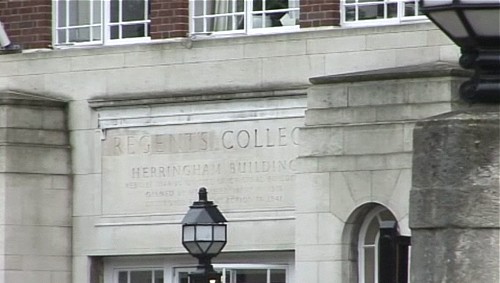
The College of Natural Nutrition diploma (over £1300) is the only qualification of Barbara Nash. Nash is the ‘nutritionist’ who treated Dawn Page with a ‘hydration diet’, that resulted in organ failure, epilepsy and brain damage. Nash’s insurers paid £800 000. in damages, but didn’t admit liability.
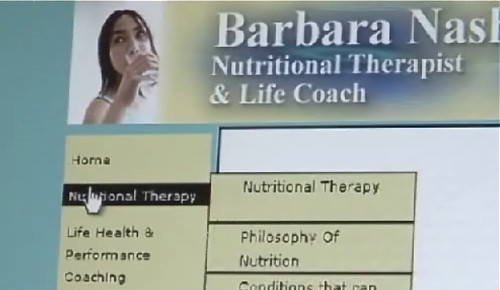
Dr Ben Goldacre pointed out that it perhaps isn’t surprising that people like Nash so often act far beyond their competence because they are being “aggrandised by the strange made-up colleges and bodies that are training and accrediting them”.
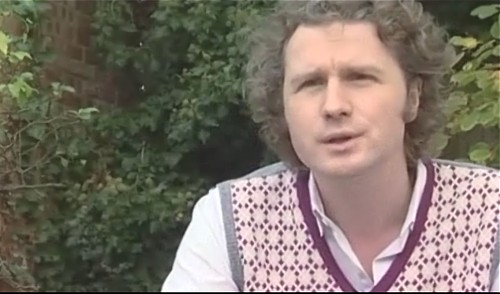
When you see some of the things she was taught, it isn’t surprising. Secret video recording revealed some totally bizarre teaching by the College principle, Barbara Wren.
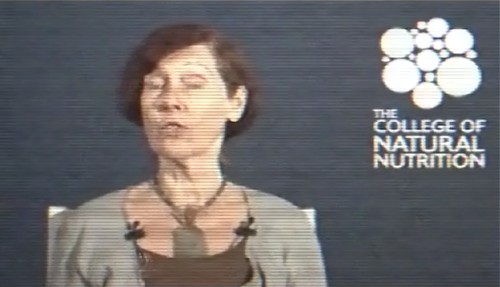
She claimed to have cured thyroid cancer by applying external compresses, half an hour with castor oil and half an hour with your own urine. Claiming to be able to cure cancer is illegal. Of course that isn’t done in public, just in private (a bit like Boots’ advice on useless supplements)). The BBC did some secret filming.
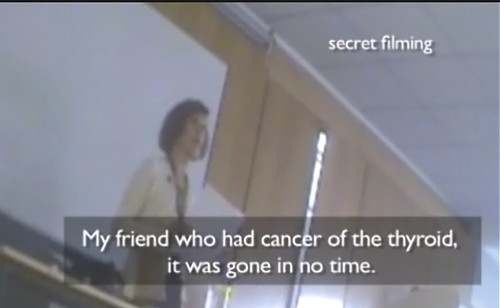
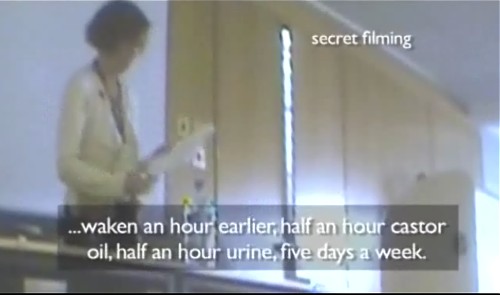
And what caused the cancer? A computer stored under the bed.

Catherine Collins commented “It would be laughable if it wasn’t so serious.
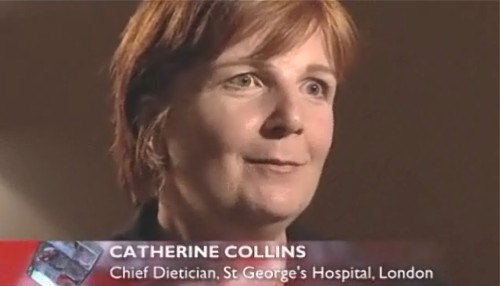
In another lecture, Barbara Wren sounds very peevish because she is going to be prevented from “prescribing” 25 times the safe dose of iodine. She advises her hapless customers to go to a pet shop and buy Lugol’s (iodine) solution, used to treat fish tank water, so they can poison themselves in peace.
The College of Natural Nutrition, and Barbara Nash, are both still in business The web site of the former has the disclaimer
“People who take the information and make decisions regarding their health or medical care, which they believe are based on ideas contained in this website, do so at their own risk. The author and publisher are not responsible for any adverse effects or consequences resulting from the use of any of the suggestions or information contained in the website “
I doubt if that is enough to exempt you from the Cancer Act. Anybody who does make medical decisions based on this utterly batty advice might be thought to deserve what they get.
Alternatively, if you are daft enough, buy the course..

Postscript. Some other blogs that give good information about this topic include Thinking is Dangerous and NHS Blog doctor
Today brings a small setback for those of us interested in spreading sensible ideas about science. According to a press release
“The BMJ Group is to begin publishing a medical journal on acupuncture from next year, it was announced today (Tuesday 11 November 2008).
This will be the first complementary medicine title that the BMJ Group has published.”
And they are proud of that? What one earth is going on? The BMJ group is a publishing company which says, of itself,
“Our brand stands for medical credibility. We are one of the world’s best known and most respected medical publishers.”
Well perhaps it used to be.
They have certainly picked a very bad moment for this venture. In the last year there have been at least five good books that assess the evidence carefully and honestly. Of these, the ones that are perhaps the best on the subject of acupuncture are Singh & Ernst’s Trick or Treatment and Barker Bausell’s Snake Oil Science. Both Ernst and Bausell have first hand experience of acupuncture research. And crucially, none of these authors has any financial interest in whether the judgement goes for acupuncture or against it.
Here are quotations from Singh & Ernst’s conclusions
“Reliable conclusions from systematic reviews make it clear that acupuncture does not work for a whole range of conditions, except as a placebo.”
“There are some high quality trials that support the use of acupuncture for some types of pain and nausea, but there are also high quality trials that contradict this conclusion. In short, the evidence is neither consistent nor convincing – it is borderline.”
The House of Lords’ report in 2000 tended to give acupuncture the benefit of the (very considerable) doubt that existed at the time the report was written. Since that time there have been a lot of very well-designed trials of acupuncture.
Now it is quite clear that, for most (and quite possibly all) conditions, acupuncture is no more than a particularly theatrical placebo. Perhaps that is not surprising insofar as the modern western practice of acupuncture owes more to Chinese nationalistic propaganda that started in the time of Mao-Tse Tung than it owes to ancient wisdom (which often turns out to be bunk anyway).
The BMJ Group has decided to endorse acupuncture at a time when it is emerging that the evidence for any specific effect is very thin indeed. Well done.
The journal in question is this.
Acupuncture in Medicine is a quarterly title, which aims to build the evidence base for acupuncture. It is currently self-published by the British Medical Acupuncture Society (BMAS).
One good thing can be said about the Society and the Journal. That is that they don’t espouse all the mumbo-jumbo about ‘meridians’ and ‘Qi’. This, of course, puts them at odds with the vast majority of acupuncture teaching. This sort of internecine warfare between competing sects is characteristic of all sorts of alternative medicine. But that is just ideology. What matters is whether or not sticking needles in you is actually anything more than a placebo.
British Medical Acupuncture Society (BMAS)
The British Medical Acupuncture Society (BMAS). is “a registered charity established to encourage the use and scientific understanding of acupuncture within medicine for the public benefit.”. The phrase “encourage the use” suggests that they do not even envisage the possibility that it might not work. Their web site includes these claims.
Acupuncture can help in a variety of conditions:
- Pain relief for a wide range of painful conditions
- Nausea, especially postoperative nausea and vomiting
- Overactive bladder, also known as bladder detrusor instability
- Menstrual and menopausal problems, eg period pains and hot flushes
- Allergies such as hay fever and some types of allergic rashes
- Some other skin problems such as ulcers, itching and localised rashes
- Sinus problems and more
Presumably the word “help” is chosen carefully to fall just short of “cure”. The claims are vaguely worded, but let’s see what we can find about them from systematic reviews. It appears that the BMAS is being rather optimistic about the evidence.
BMJ Clinical Evidence is considered reliable and is particular interesting because it is owned by the BMJ Publishing Group.
Low Back Pain (chronic) Acupuncture is listed as being of “unknown effectiveness”.
Dysmenorrhoea Acupuncture is listed as being of “unknown effectiveness”.
Osteoarthritis of the knee. Acupuncture is listed as being of “unknown effectiveness”.
Psoriasis (chronic plaque) Acupuncture is listed as being of “unknown effectiveness”.
Neck pain “Acupuncture may be more effective than some types of sham treatment (not further defined) or inactive treatment (not further defined) at improving pain relief at the end of treatment or in the short term (less than 3 months), but not in the intermediate term (not defined) or in the long term (not defined)”
Headache (chronic tension-type) Acupuncture is listed as being of “unknown effectiveness”.
What about the greatest authority, the Cochrane Reviews?
Cochrane Reviews
Low back pain The data do not allow firm conclusions about the effectiveness of acupuncture for acute low-back pain. For chronic low-back pain, acupuncture is more effective for pain relief and functional improvement than no treatment or sham treatment immediately after treatment and in the short-term only. Acupuncture is not more effective than other conventional and “alternative” treatments. The data suggest that acupuncture and dry-needling may be useful adjuncts to other therapies for chronic low-back pain. Because most of the studies were of lower methodological quality, there certainly is a further need for higher quality trials in this area.
Chronic asthma. There is not enough evidence to make recommendations about the value of acupuncture in asthma treatment. Further research needs to consider the complexities and different types of acupuncture.
But most of the vaguely-worded claims made by BMAS have not been the subject of Cochrane reviews. The obvious interpretation of that is that there is not enough evidence to make it worth writing a review. In which case, why does BMAS claim that acupuncture can “help”?
Bandolier is another excellent source of high quality information, This was their view in September 2006
“Large, high-quality randomised trials of acupuncture have been published since the reviews. In fibromyalgia, chemotherapy-induced nausea and vomiting, breech presentation, tension headache, and migraine, all were negative compared with sham acupuncture. One in osteoarthritis of the knee, had statistical improvement over sham acupuncture at three months, but not later. Both large trials and this review of reviews come to the same general conclusion; that over a whole range of conditions and outcomes acupuncture cannot yet be shown to be effective.”
After thousands of years of acupuncture (or at least almost 40 years in the West) there seems to be very little to show for it.
The journal: Acupuncture in Medicine
What about the journal in question? Like all journals devoted to alternative medicine, it claims to be evidence-based. And like all journals devoted to alternative medicine it suffers from a fatal conflict of interest. If this journal were ever to conclude that acupuncture is a placebo, it would destroy the journal and the livelihoods of many of the people who write for it.
Scanning the first three issues of 2008 shows that it is very much like other alternative medicine journals. Most of the papers don’t address the critical question, is it a placebo. And most papers end up rather limply, with a statement along the lines “acupuncture may be useful for ***. More research is needed.”
The editor in chief of the journal is Dr Adrian White, and its editor is Michael Cummings. White is quoted by Ernst in the Guardian in 2004.
“We need to provide hard evidence to support what we all see in our clinics every day: that the modern approach to acupuncture works, and is highly relevant to the new, patient-centred NHS.” .
That means the answer is assumed in advance. That just isn’t science.. ‘We know the answer, all we have to do now is get some evidence’.
Why should the BMJ Group want to do a thing like this?
The press release says
Commenting on the move, BMJ and BMJ Journals Publishing Director, Peter Ashman, said “The journal is a good complement for our existing portfolio of journals and we’re certain that the Society’s members and other subscribers will appreciate the benefits of the decision the BMAS has made on their behalf.”
He continued: “The BMAS is ambitious for its journal to grow and flourish and we’re looking forward to working with the Society to develop an editorial and commercial strategy which will achieve the aims of BMAS and those of its members, while reaching out to the wider global community interested in this fascinating area of medicine.”
Yes, you got it. Money. The same motive that causes some vice-chancellors to bring their university into disrepute by awarding BSc degrees in subjects that are not only not science, but which are oftenly openly anti-science.
Conscience doesn’t seem to bother these people, so let’s put the problem in purely cash terms.
Both the BMJ Group and the vice-chancellors will have to decide whether the cash they gain is sufficient to counterbalance the corrosive effects of their actions on their own reputations.
Follow-up
Only a couple of days later, two new trials show acupuncture is no different from sham controls for helping IVF pregnancy rates. James Randerson in the Guardian writes thus.
“Acupuncture aimed at improving IVF success rates is widely offered by fertility clinics in the UK. In the first of the studies, researchers in Hong Kong split 370 women receiving IVF into two groups. One group received real acupuncture before and after having an IVF embryo implanted into their uterus. The other had the same procedure, except the treatment used retractable needles that did not penetrate the skin.”
“Of the 185 who received the sham treatment, 91 achieved a clinical pregnancy (foetal heartbeat identified using ultrasound) and 71 had a successful delivery. This compared with 72 clinical pregnancies in the true acupuncture group and 55 live births. The differences between the groups were not statistically significant.”
“In a second study, researchers in Chicago used a similar design in which 124 women received true or sham acupuncture. The control group had their skin punctured by real acupuncture needles, but not at genuine “Qi-lines” on the body. In the true acupuncture group, 43.9% achieved a clinical pregnancy, compared with 55.2% of the women given the sham treatment. “
The original paper for the first study can be seen here.
Jump to follow-up: Brian Kaplan
| Obama wins! Bush and Blair have gone. Could this mark the beginning of the end of the fashion for believing things that aren’t true? |
Trinity College Dublin: the Phil. “Creationism is a valid world view”
This is the 324th year of the Trinity College Philosophical Society (known locally as the ‘Phil’). Its former members include Bishop Berkeley, Dean Jonathan Swift, Oscar Wilde, Bram Stoker, Samuel Beckett, and E.T.S. Walton . It was founded for “discourse of philosophy, mathematics, and other polite literature ”, and is now a debating society.
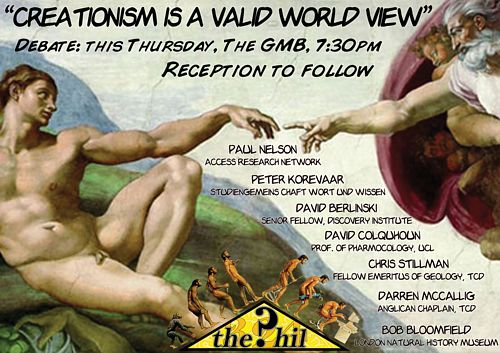
The motion was Creationism is a Valid World view. At the dinner before the debate, the students all dutifully stood as one of them recited long graces in Latin both before and after eating. All very Oxbridge. So I wasn’t optimistic. However I hadn’t taken into account the conformist tendencies of undergraduates. Notwithstanding the Latin graces, the result of the debate was very clear indeed.
Result. The Creationists were totally wiped out. Almost the only vote for the motion was a young born-again student, who made a desperately sincere speech.
I don’t need to give the details of what happened, because the opposer of the motion, Bob Bloomfield (of the Natural History Museum) has given an excellent account (The Discovery Institute send big guns to Ireland but only manage to fire blanks) on the Beagle project blog. Two of the proposers were Americans, from the Discovery Institute, and they said what you’d expect: nothing that would impress anyone with any education. I’ll settle for Bloomfield’s description of me as “charmingly irascible”. Irascible, moi? Well it would make anyone mildly irritated to have to spend time arguing about creationism in 2008.
Religion, all religion, seems to me to be boring and not a thing worth wasting good time on thinking about, but the rise of barmy fundamentalism has made it essential, if only so that genetics can be taught without accusations of racism, I’m entirely with Dawkins, I can’t prove that there is no god, and I can’t guarantee
that the bottom of my garden is free of fairies. Both questions merit about the same amount of time, though if pressed, I’d go for the fairies. They are, allegedly, rather better behaved than gods.
The 24th president of the USA said, when asked for his thoughts on evolution, said
“of course like every other man of intelligence and education I do believe in organic evolution. It surprises me that at this late date such questions should be raised”.
Woodrow Wilson, 1922
That, of course, was from a president who has been described as ” leading intellectual of the Progressive Era”.
How things have changed in the time of Tony Blair, George Bush and Sarah Palin. Very few people had such barmy beliefs in 1960, never mind 1922. My thesis is much the same as that of Francis Wheen in “How mumbo-jumbo conquered the world” Sometime around 1980, with the conjunction of Thatcher, Reagan and Khomeini it came into fashion to believe things that aren’t true, just because you wished they were (actually I’d put it a bit earlier than Wheen: arguably it started when the Beatles went to that guru), It was after that when suddenly people started to believe in magic medicine, religious fundamentalism. weapons of mass destruction, and, ahem, that the market would make us rich if only we would remove all the regulations.
Tony Blair defended in parliament the Emmanuel School which is run by a young earth creationist and used car dealer, Peter Vardy. The head of the school, Nigel McQuoid, features strongly on the web site of the Christian Institute, This curious organisation seems to be devoted largely to creationism, homophobia and the virtue of beating children (a search of the site for “corporal punishment” gives 43 hits). An essay by Burns & McQuoid says
“There are those who argue that Science and Christianity can be harmoniously reconciled . ; ;. We cannot subscribe to this view”
The former head of science (yes, of science) at McQuoid’s school, Steven Layfield, had an article on the Christian Institute web site. It vanished as soon as it got some publicity but you can read it at http://www.darwinwars.com/lunatic/liars/layfield.html.
Try this quotation.
“Note every occasion when an evolutionary/old-earth paradigm (millions or billions of years) is explicitly mentioned or implied by a text-book, examination question or visitor and courteously point out the fallibility of the statement. Wherever possible, we must give the alternative (always better) Biblical explanation of the same data.”
| These guys are really at the fruit-cake end of the religious spectrum. In contrast, the young anglican chaplain of Trinity, Darren McCallig, spoke against creationism, eloquently and sensibly. His religiousness did seem at times to be diluted almost to homeopathic extremes, but all the better for that. He seems to have a sense of humour too, judging by the poster for his services. |  click to enlarge |
There is, of course, a very healthy opposition to creationists in the USA too, I like particularly Gerald Weissman’s article “The facts of evolution: fighting the Endarkenment” (it may have been the first time that I saw the wonderful word endarkenment, which describes so well the last 30 years). It starts thus.
“Those of us who practice experimental science are living in the best of times and the worst of times, and I’m not talking about A Tale of Two Cities, but a tale of two cultures. “
Here are a couple of pictures of the meeting.
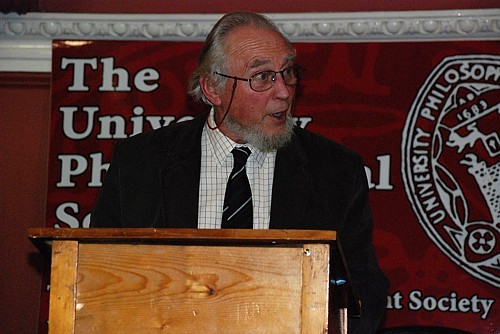
Chris Stillman (geologist)
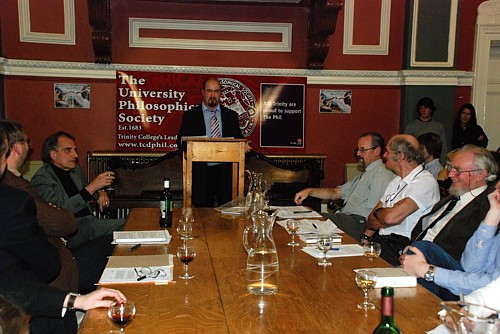
Berlinski (left) Luke Ryder (speaking), Bloomfield, DC, Stillman (right)
And some pictures of Dublin here
James Joyce, TCD quadrangle and Molly Malone. Click to view
UCL homeopathy debate
This was organised by the UCL students’ debating society. The Darwin Lecture theatre was surprisingly full for this debate, but they weren’t all students. As usual on these occasions, the homeopaths tried to pack the audience, but this time they failed. That tactic is fair enough I suppose, but it means that the vote failed to tell us anything much about the opinion of students, beyond the fact that not many of them opposed the motion.
There are a few though. To the horror of some of our pharmacology and neuroscience undergraduates, a student society devoted to medicines that don’t work has been started at UCL, for the first time ever. Luckily, it seems to be a rather small society. I was fascinated to see that they are going to hear about the evidence base for complementary therapies, from George Lewith. I had occasion a while ago to look at Dr Lewith’s attitude to evidence: see Lewith’s private clinic has curious standards.
| The proposers were Simon Singh and me. Simon is author of, among other things, Fermat’s Last Theorem and Trick or Treatment. I thought he did an excellent job. Singh pointed out that, contrary to the view propagated by quacks, science likes wacky ideas, as long as you can produce the evidence for them He cited dark matter as an example. |
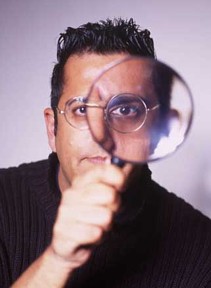 |
The main opposer was my old friend Peter Fisher, homeopathic physician to the Queen. It was a pleasure to show the video of Fisher agreeing with me that there is not enough science in homeopathy to justify a BSc degree in it. Fisher, in his papers, strikes me as one of the most honest of homeopaths. He was “very angry” when homeopaths were caught out recommending their sugar pills to prevent malaria. But is his speech, he struck me as less than honest. He cherry-picked the evidence quite shamelessly as usual. And his suggestion that there was an analogy between the ‘memory of water’ and a DVD was disposed of ably by a physics student who spoke from the floor.
The results were too close for comfort, 65 for, 53 against and an amazing 37 abstentions,
Sadly we’ll never know how the students voted, because of the imported homeopaths.
| Dr Brian Kaplan was there. He had given the meeting some advance publicity, in a web posting that also kindly gave publicity to our 2006 letter to the Times. He didn’t like the letter, which is unsurprising given that it turned out to be more effective than we could ever have hoped (see also here). |  |
On the second row, getting very excited, was homeopath Grace Da Silva-Hill and her husband, She runs the ‘Healing with Grace’ business. On her web site she makes the ludicrous claim that
“Homeopathy will treat the cause of your health problem, not just alleviate your symptom”
She also says, inter alia, that
“Homeopathy is effective in treating a wide range of conditions such as: asthma, . . . “
In contrast, the Cochrane review says
“There is not enough evidence to reliably assess the possible role of homeopathy in asthma. “
I have been sent her account of the debate (a reply to a query from the ubiquitous Dana Ullman).
“Hello Dana, The debate, on monday 20th Oct., organised by UCL debating society, was poorly managed, and biased, attended mostly by students, who appear to have gone there to practice their debating skills. The motion was lost by 12 (65 for and 53 against), with 37 abstentions. Peter Fisher put on a good show, and so did his second, in comparison with the rather stale and poor presentation of Simon and Qulquoun (sorry, can never spell this). My husband Ken did a rather
good caricature of him, unfortunately can’t share it here. Pity there were not more homeopaths/supporters there. Kind regards,”
Uhuh. Well, I guess she would say that.
You can judge the critical faculties of Mrs Da Silva-Hill from a comment she left on a piece in the Daily Telegraph, ‘Homeopathy putting lives at risk with claims’. I quote from it verbatim.
“The public does not care about the research available, the public care about having their health problem sorted, where conv. medicine has failed,”
(I apologise for attributing to Mrs Da Silva in the original post a quotation from the Telegraph that appeared above her name but was actually written by somebody else. I apologise also for using a picture of her without permission.)
On the way out of the debate, I walked back to Euston Road with another homeopath, William Alderson, who had come all the way from Kings Lynn to cast his vote. He was earnest and sincere, the conversation was amicable but his idea of evidence was so different from mine that no progress was made. You can read more about Alderson on Dr Aust’s blog.
It’s fascinating stuff.
Follow-up
Dr Brian Kaplan has posted some splenetic comments on this post. I suppose the paranoid tone is an indication that we are winning, but I do wish he’d be a bit more careful about the facts. Let me correct some of them.
(1)Neither the letter of May 2006, nor its follow up in May 2007, was written under the NHS letterhead. The follow-up letter of May 2007 contained the words
“If you have not already reviewed your own trust’s provision, you might find it useful to consider, in conjunction with your Director of Public Health, the paper that we have enclosed which, while not a full review of the scientific position, has been used by other trusts to promote evidence based commissioning.”
The enclosed form was a sample commissioning letter which reproduced the NHS logo with a notice saying “insert your NHS logo here”. The accompanying letter made it perfectly clear that the enclosed form was simply an example to help those who wanted to save money and not an official NHS communication.
(2) Kaplan says I accuse him of lying to his patients, but his reference is to (an old version of) my Dilemmas at the heart of alternative medicine. It says nothing of the sort. I have said many times that I believe homeopaths are perfectly sincere, but they are just deluded. The reference to lying in the ‘dilemmas’ concerns how to get the maximum placebo effect when you know it is a placebo. Homeopaths have not reached that stage yet.
All this information has been available since May 2007. He should have checked.

